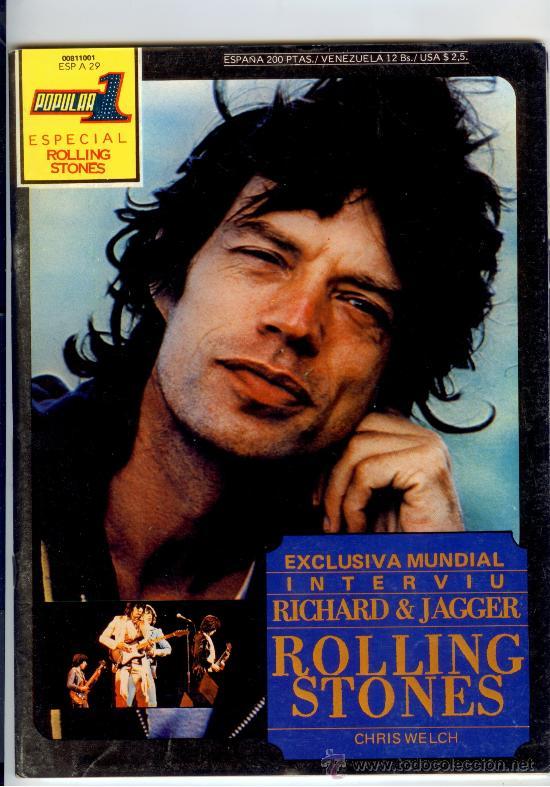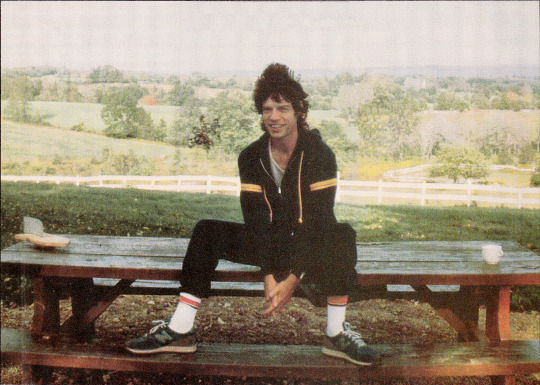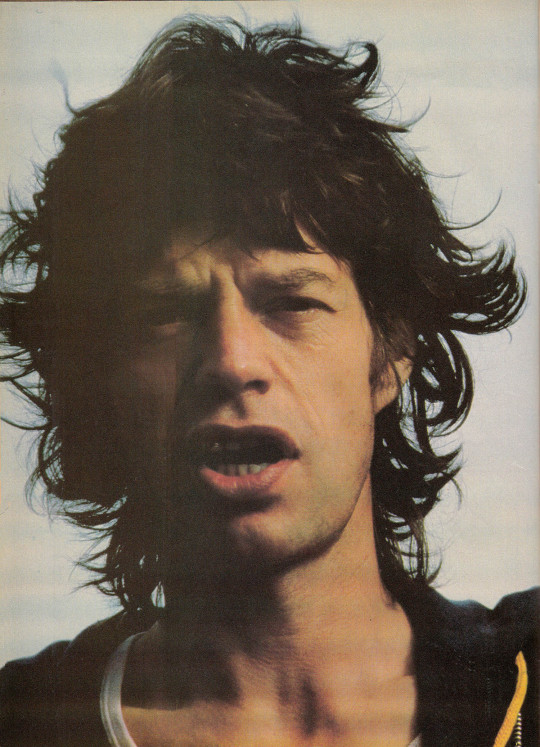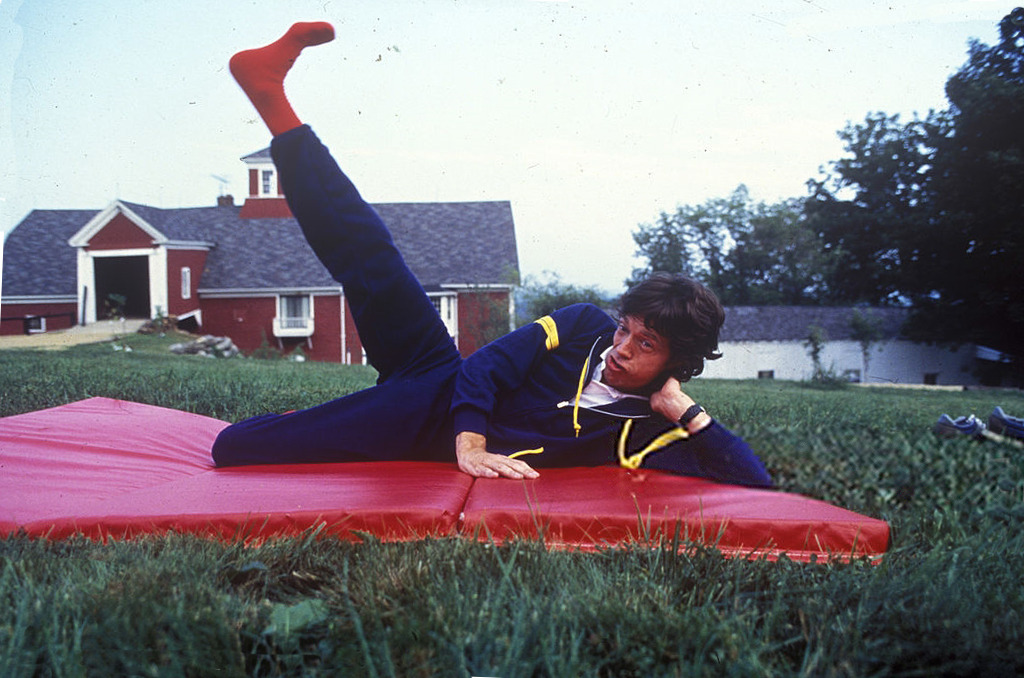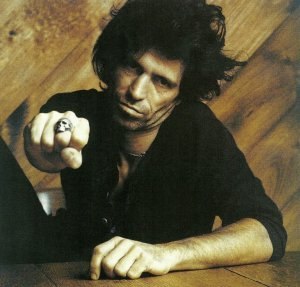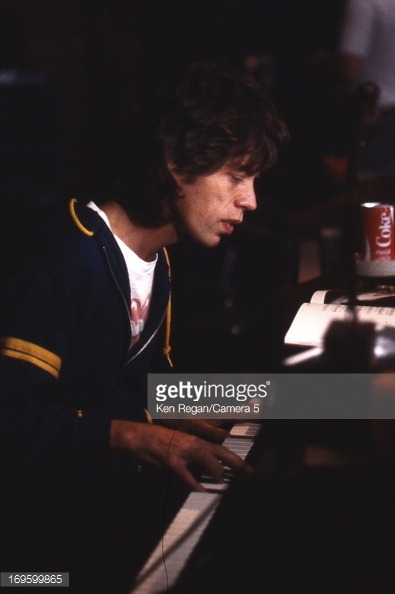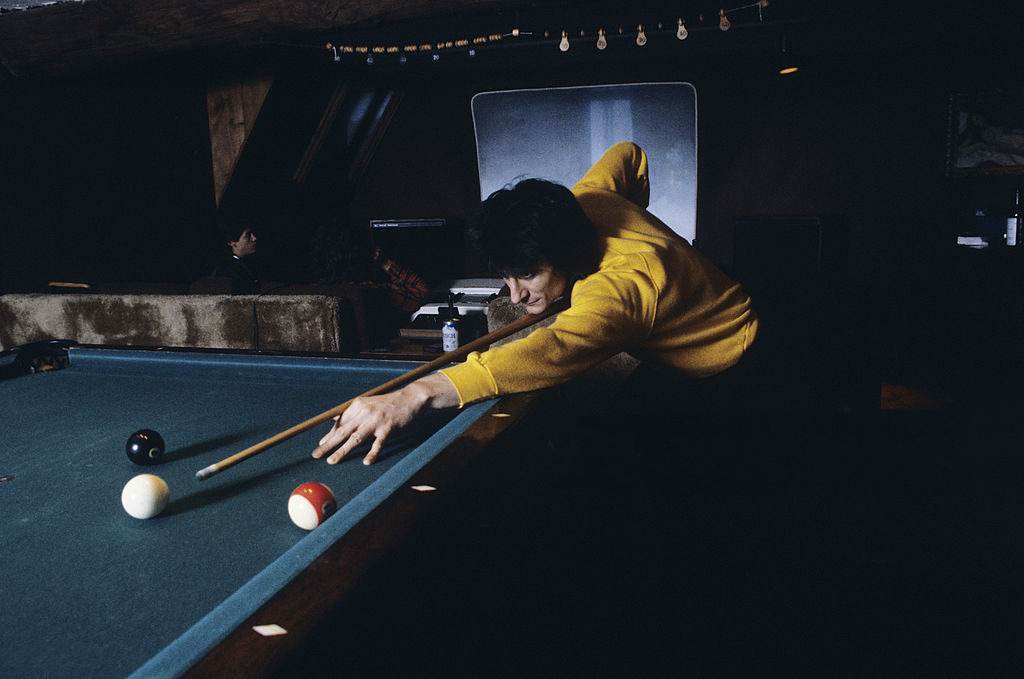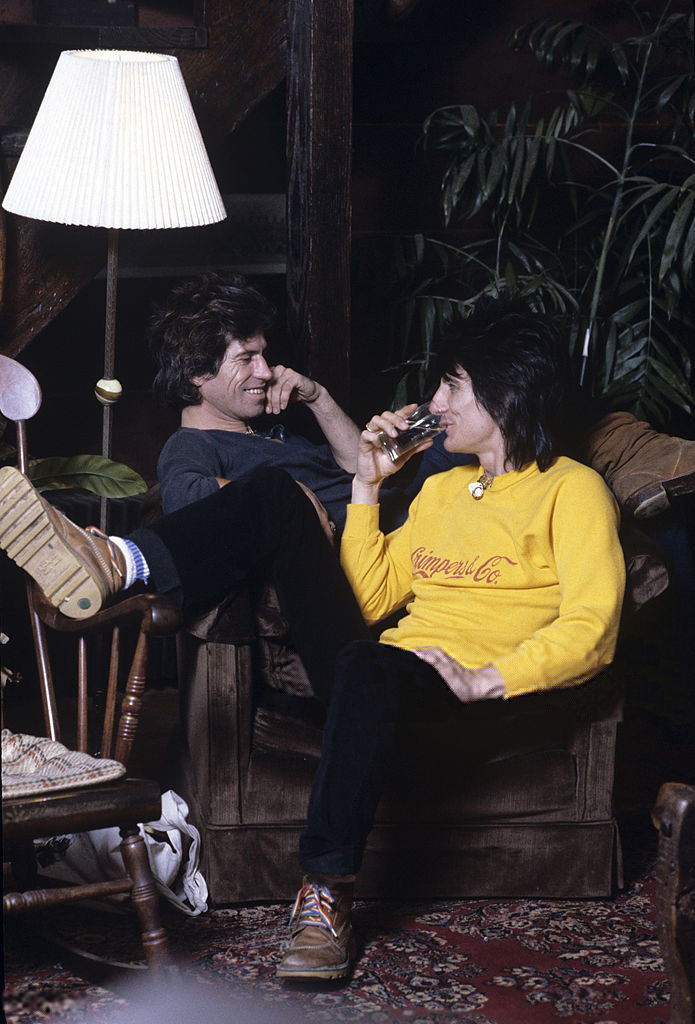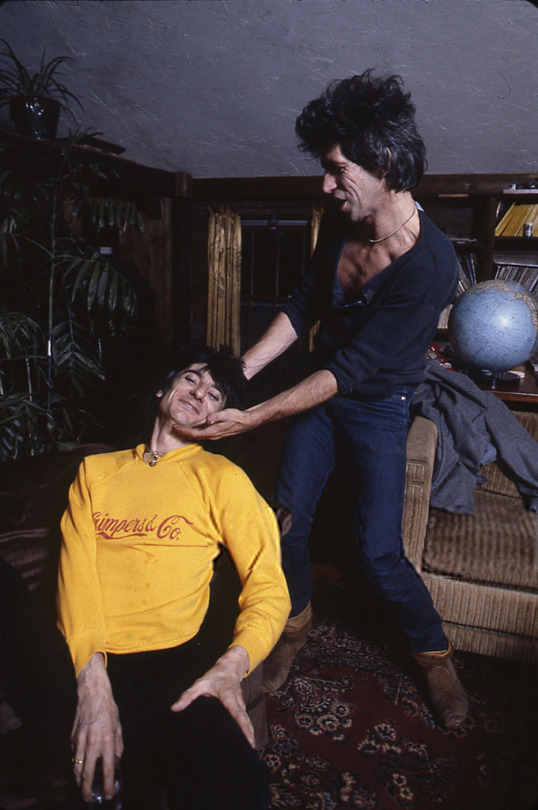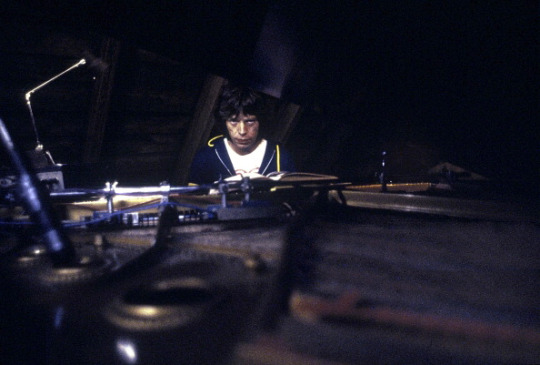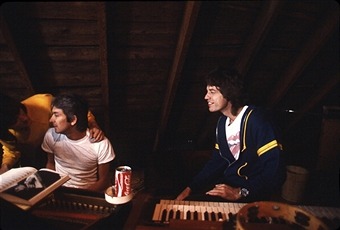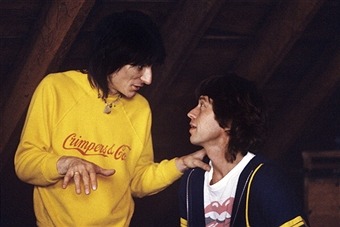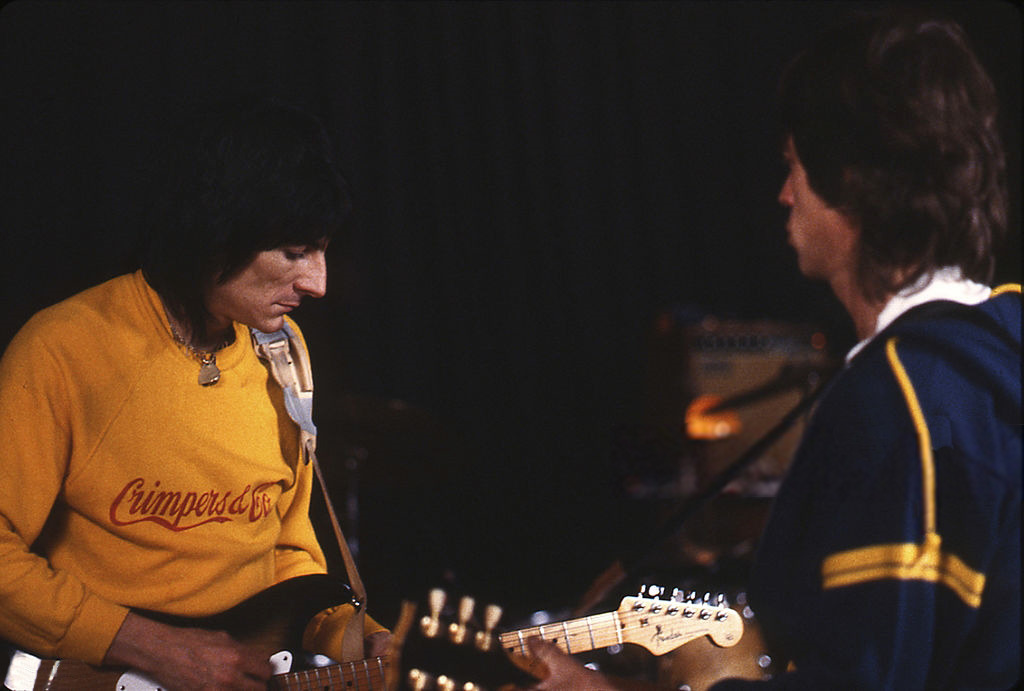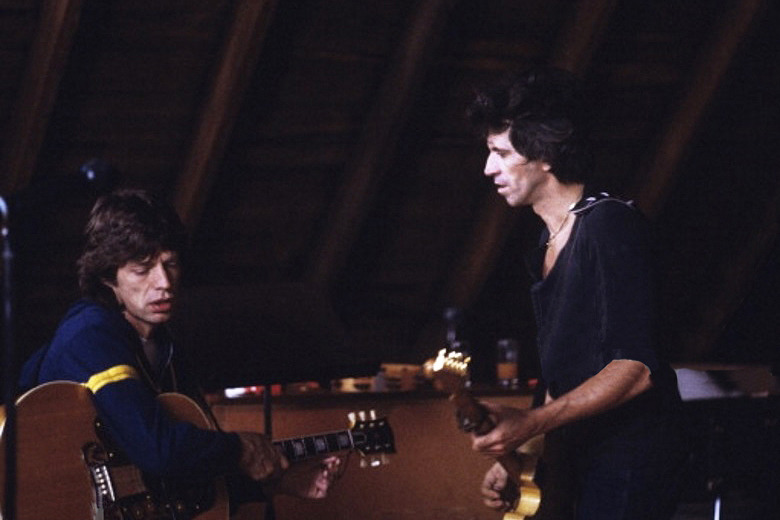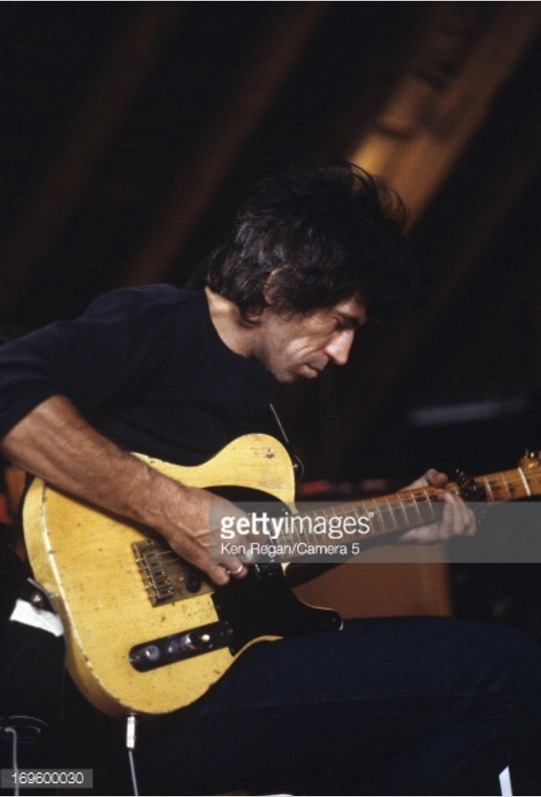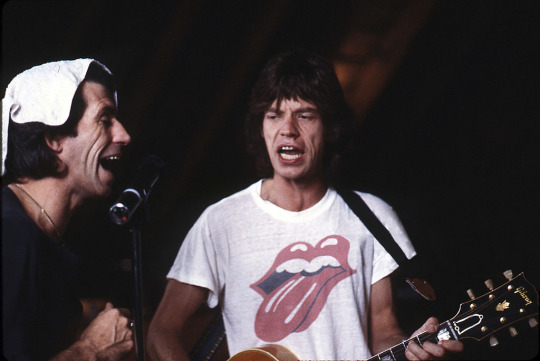Tell Me :
Talk

Annie Leibovitz 1983
Edited 1 time(s). Last edit at 2016-09-19 09:55 by exilestones.

Listed as 1980 Annie Leibovitz
 JIMMY CLIFFE KEITH PATTI NYC 81
JIMMY CLIFFE KEITH PATTI NYC 81
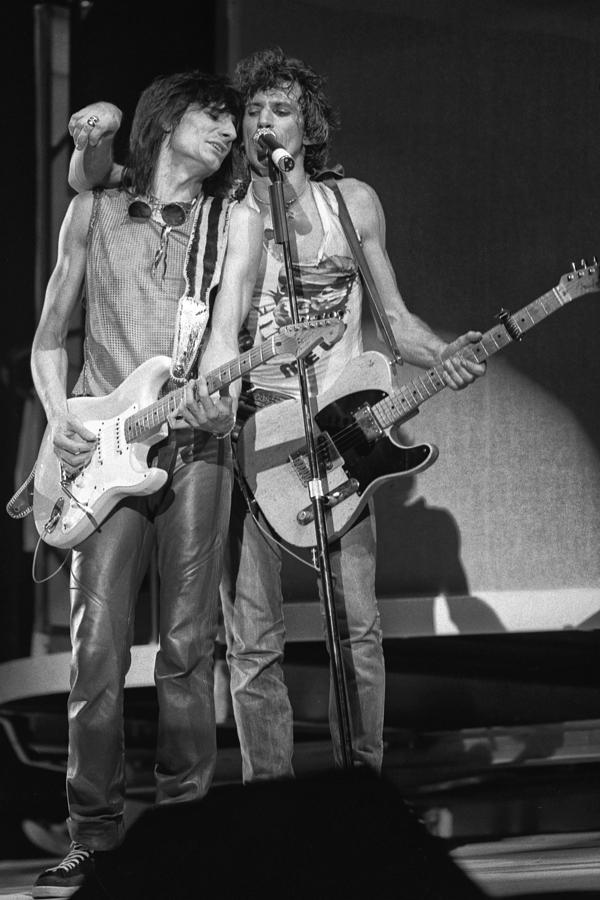 Jurgen Lorenzen Louisville KY
Jurgen Lorenzen Louisville KY






Photos are from Philadelphia
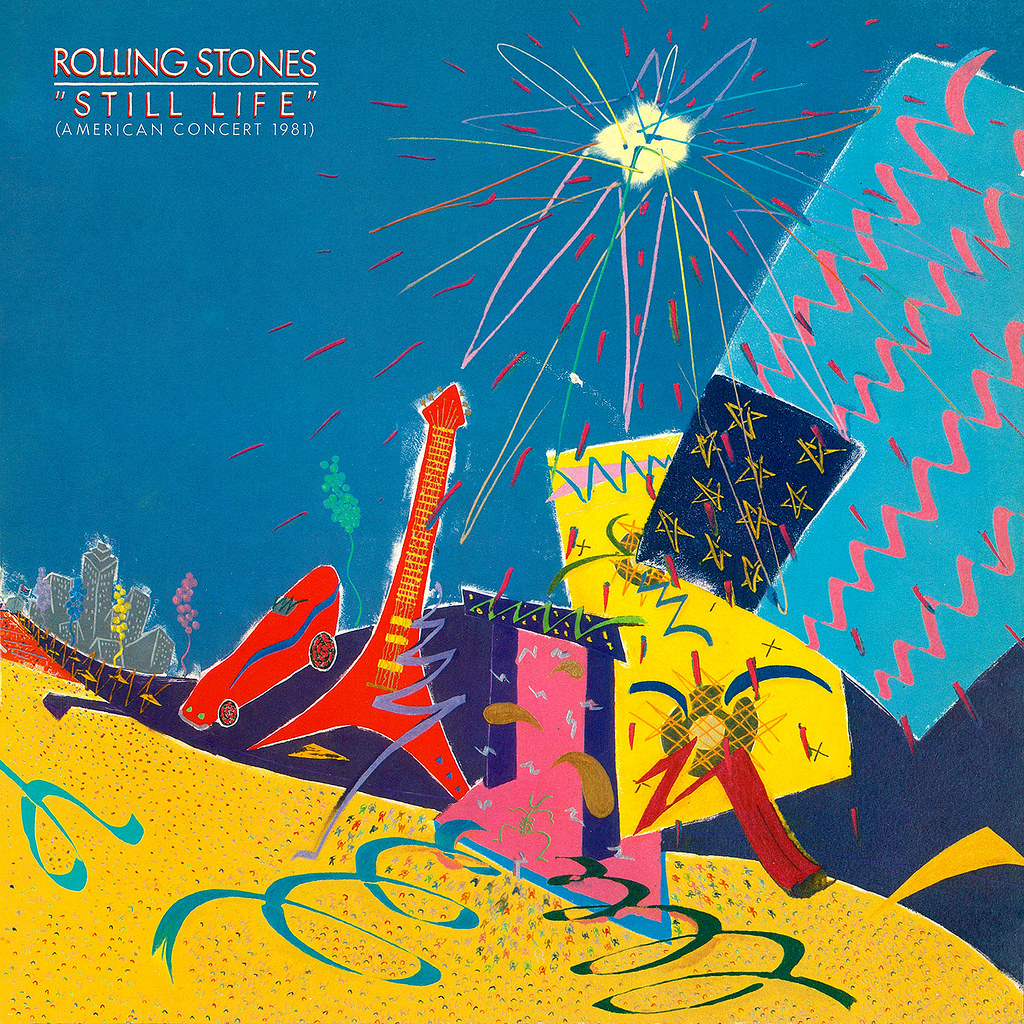
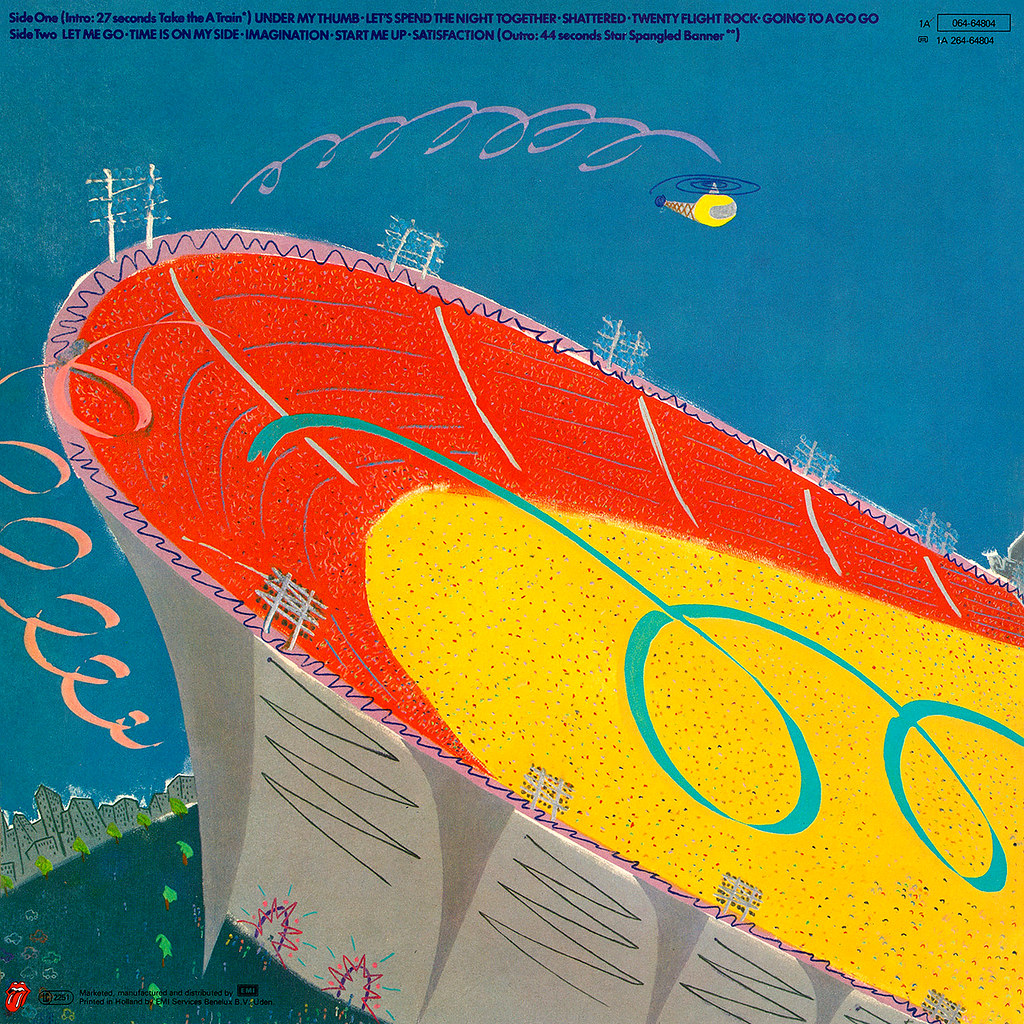
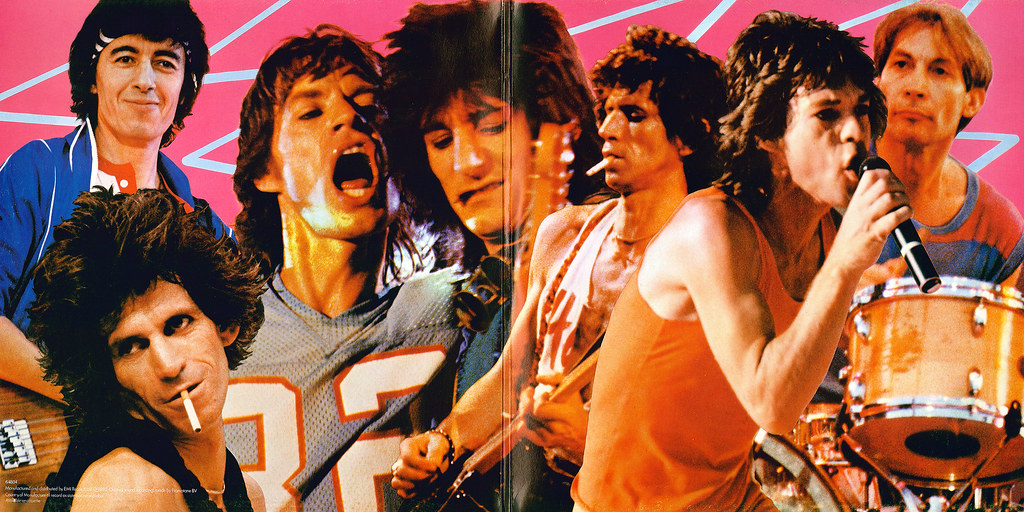

STILL LIFE
Recorded by Rob Clearmountain and David Hewiit with the Record Plant remote (NY)
Mixed by: Bob Blearmountain at Power Station Studios
Producer: The Glimmer Twins
Musiker:
Mick Jagger (Vocals, Guitar)
Keith Richards (Vocals, Guitar)
Charlie Watts (Drums)
Bill Wyman (Bass)
Ron Wood (Vocal, Guitar)
Ian Stewart (Piano)
Ian Mc Lagan (Keyboards)
Ernie Watts (Saxophone)
Assistant Engineers: Malcolm Pollack, Barry Bongiovi and Larry Alexander, Phil Gitomer, Kooster MacAllister and David "DB" Brown
Mastered by Robert C. Ludwig for Masterdisk
Covergestaltung: Kazushige Yamazaki
Australien / 1986 / RSR 450204 2
Canada / 1982 / RSR WEA CD 39113
Slovenien / Juni 1991 / RSR CBS 450 204-2
++++++++++
820300E March - April: New York City, The Power Station. Producers: The Glimmer Twins.
Mixing engineer: Bob Clearmountain. MJ, KR, RW and CW edit the songs for the upcoming live album Still Life and record overdubs.
- Beast Of Burden (MJ/KR) -Chicago 25.11.81
- Going To A Go Go -Largo 9.12.81
- Just My Imagination -Hampton 19.12.81
- Let Me Go (MJ/KR) -Largo 8.12.81
- Let’s Spend The Night Together (MJ/KR) -Hampton 18.12.81
- Satisfaction (MJ/KR) -Tempe 13.12.81
- Shattered (MJ/KR) -Hampton 18.12.81
- Start Me Up (MJ/KR) -Chicago 25.11.81
- Under My Thumb (MJ/KR) -Rutherford 5.11.81
- Time Is On My Side -Hampton 18.12.81
- Twenty Flight Rock -Largo 9.12.81
Note: All songs were remixed except Let’s Spend The Night Together. Songs were recorded by Bob Clearmountain and David Hewitt with the Record Plant Remote.
credit: [www.nzentgraf.de]
THE COMPLETE WORKS of the Rolling Stones
.JPG[/img]

Still Life was a commercial success going platinum, but was not critically well-received, being admonished for sounding too slick and lacking any rough edges expected in a Rolling Stones performance.
++++
The 1981 North American tour kicked off in late September and wound up in mid December with the band having played to almost 2.2 million fans at 50 concerts, with many of the songs on the album being played live during the band’s two-hour plus show.
The success of this album in Britain was helped by the European tour that began at the end of May in Scotland and ended in Leeds, England at the end of July having played to close to 1.7 million fans.

ROLLING STONES On Still Life: A Mini Special (Extremely rare 1982 Canadian only RSR/Sonic Workshop promotional LP split into three sections featuring Keith, Mick & Bill respectively introducing six of the the songs from the album, unique rubber stamp look die cut title sleeve ROLL101).
[eil.com]



ROLLING STONES Let's Spend The Night Together (Super Rare 1982 Japanese-only promotional-only vinyl 7" for 'Special D.J.' use in support of the Still Life album release. Also features Start Me Up. The labels are wide centred & custom black onwhite. This is one very tough to find item as our man in Japan has never seen it before. It comes complete with a unique picture insert with song lyrics on the back. The insert remains a stunning off white with just a spot of faint corner creasing & the vinyl is near 'as new' PRP-1104).
[eil.com]
++++++++

++++++++


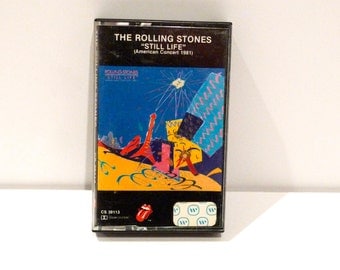




Still Life ad - Michael Halsband photo
Edited 1 time(s). Last edit at 2017-03-14 06:16 by exilestones.
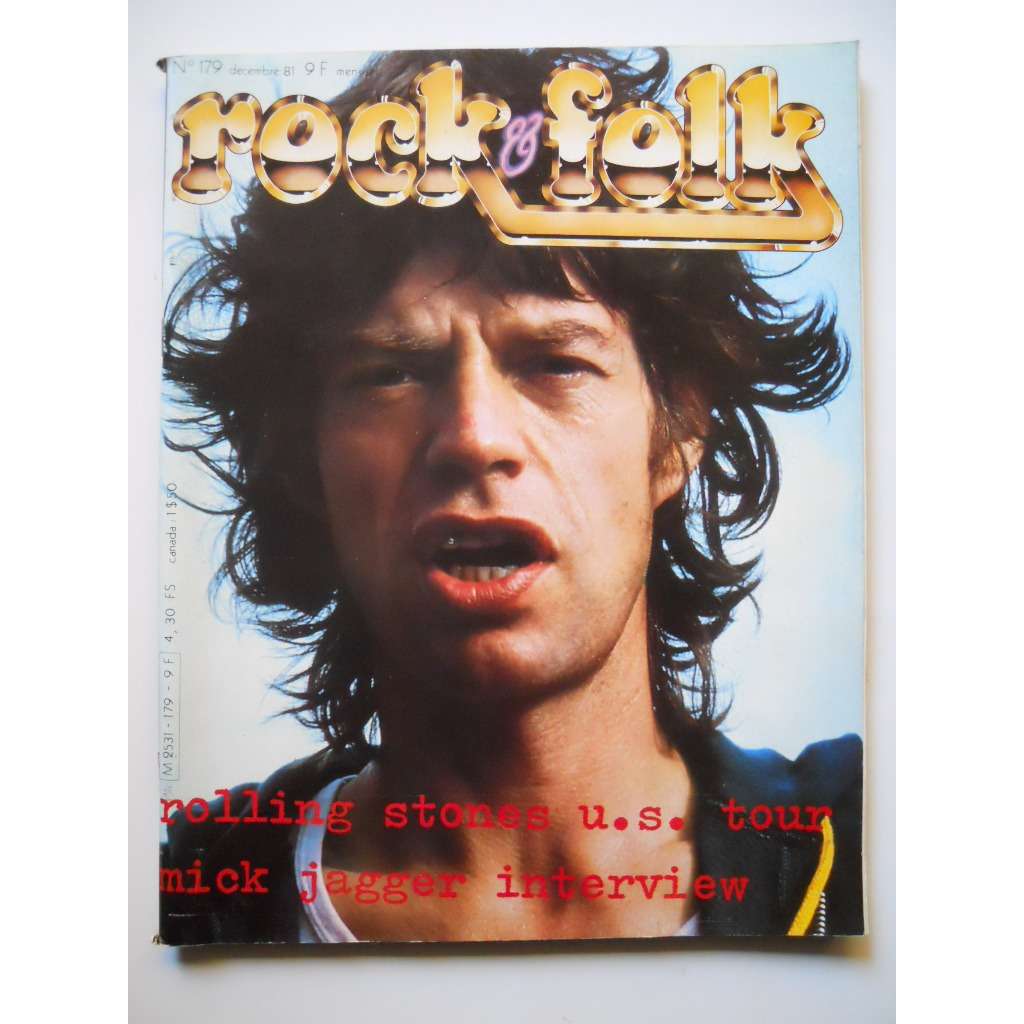
Photo taken at Long View Farm
LONG VIEW FARM:
Long View Farm was a dairy farm that had been converted to a recording studio. Stevie Wonder, J Geils, Motley Crue, and James Taylor are just some of the giants who have recorded there.
Long View was owned and operated by Gil Markle, a philosophy professor/studio engineer/entrepreneur who played host to the Stones in the summer of 1981.
To learn more about Long View Farm, the bands that Gil worked with and his experiences with some of rock’s biggest stars, and to read his book, available entirely online and detailing the
Stones’ stay at Long View Farm (including the night of the Sir Morgan’s Cove show) go to Gil’s website at www.studiowner.com .
Make sure you read about Gil’s experience with Keith Richards and the four days he spent alone with him, recording him. You can even listen online to ten tracks that Gil recorded, with
Keith singing and accompanying himself on Piano. Amazing stuff! Here's a sample:
lan Stewart was coming to check the place out one last time — to make absolutely sure we did what we said we were going to do, and that the facility was fully ready for the world's most
demanding and precocious rock 'n' roll band. "All lights green and go," he might telephone back to Alan Dunn and Mick Jagger. "They did what they said. The place is perfect. All points of
detail in place. No problem with accommodations for Bill and Astrid. Let's go."

Stu had booked himself a seat from New York City on the regularly scheduled airline, which flies crowded, inelegant, propeller-driven airplanes. Stu didn't care. He's totally unaffected by
the usual tokens of status. He was the last one out of the airplane, ambling down the steps with only his air ticket in his hand, looking relaxed, fully in control of his circumstances,
and, well — a touch bored.
"Turn that bloody thing off, will you?"
I snapped off the cassette player with a pre-prepared motion of my right hand, having just offered up the obligatory "cassette at high volume." We were on Route 122 heading back to Long
View Farm — Stu's gear in the trunk, Stu in the front seat, speaking in soft, measured tones befitting a man in his middle years.
"We've got enough of that coming our way as it is, mate. Let's not get started any earlier than we have to. What time of day is it, anyway?"
"About four o'clock, Stu. Supper will be in the early evening sometime — whenever it would suit you."
"No," Stu said, "it's not for that I'm asking. I'm just wondering how many hours of sleep I'm going to get tonight. And tomorrow night. Last bits of sleep I'm going to get for a long time.
Got to reckon with that."
"We're aware that you guys work late nights, Stu," I said.
"You haven't seen anything. You'll see how weird it gets, once they get here. You'll see. Creeps around the clock, gradually. They'll start playing an hour or two later each day, until
they're getting up about 10 PM, and playing during the early morning hours. It usually stops there. That's the schedule they'll keep to."
"Hardest on Mick, it is. He's got things to do during the day, too. Don't know how he manages. Don't know how I manage. Good Lord, here we go again. Never thought we'd do it again, after
the last tour. But look at us. Here we are. The band isn't really that important in England any more, you know.
"But look at us! Blimey! Here we go again. Makes a grown man shiver, or is that a line out of 'Tattoo You'? No, 'makes a grown man cry'. That's it.
"Don't mind me. Just getting used to the idea of doing it all. Touring again, I mean. Few days' more peace we'll have, at least."
"What do you mean by that, Stu?" I asked.
"Don't expect we'll see any band members until the beginning of the week. Mick first, probably. Charlie'll be with him. Keith's still in Rome. Just got there, so you can count him out for a
few more days, at least. Woody, too. He's still in California. Only one I'm not sure of is Bill Wyman and Astrid. Businesslike fellow, Wyman is, particularly if he thinks Mick is coming
early. Then he might, too. Have to find out about that for you. Coming from the south of France, the two of them."
"Astrid's his girlfriend?"
"Wife, you'd say. Swedish girl. Went to work au pair for Bill and his first wife years ago in London. Bill divorced his wife. Astrid stayed. Been that way ever since. You'll have your
chuckles with Astrid, I can assure you. She'll have you changing the color of the barn before she's done. Likes to get a bit of attention, she does. Mark that, what I just told you. You'll
want to pay some attention to her from the very start, or she'll bring the roof down."
"That's our strong suit, Stu." I said this just as the car was crunching its way up the long gravel drive. "Welcome to Long View, Stu. We're here."
Did I really want the Stones to come to Long View?
My phone rang again, it was still that Friday afternoon, and I had just talked with Alan Dunn, and with Geoff Myers at the Farm. "The Stones are coming," I repeated to myself, and
lunged for my pretty red phone.
"Gil, ba-by!" It was Rory McPherson on the line, a friend of mine for years, also a friend of James Taylor, always worked at RCA in New York. Always wanted to help me out somehow at
Long View, but he never did, or couldn't, or something. Rory wouldn't always take my telephone calls.
"Hey, little buddy, I knew you'd do it. Little buddy, you get ready. You have arrived!"
"What are you talking about, Rory?"
"Hey, ba-by, don't you give me that. The word's out, and the whole town's buzzing about it. It's you, man. And it's the Rolling Stones. The Stones, Gil. Baby, congratulations!"
"Man, you are in one shitload of trouble, let me tell you that. You are in water so hot you don't even know ...."
"What are you talking about, Mike?"
"You know damn well what I'm talking about, or you will when I'm through. Sometimes I think I'm the only friend you got, who will tell you things. Gil, are you ever in trouble!"
"O.K., Mike, I give up, what trouble?"
"The Stones, man, and the drugs. It's the drugs, Gil. Listen, you've had the law looking really close at you out there ever since Stevie Wonder Day, and you know what I'm talking about.
And now you've got Keith Richards, who's supposed to be the biggest drug addict in the world, coming to stay with you. Very cozy. Gil, you're gonna get busted. They'll just waltz right in
there, knowing they'll find something, somewhere, and that'll make 'em right, do you hear me? These guys wanna be right about you, and so far they're not. They want you to be crooked, Gil,
and this'll make 'em right. What's the matter with you?
"Mike, I don't even know for sure that the Stones are coming to Long View Farm. I don't even know that much."
Edited 2 time(s). Last edit at 2016-10-07 18:38 by exilestones.
Edited 1 time(s). Last edit at 2016-10-10 06:10 by exilestones.

Talk about your favorite band.
For information about how to use this forum please check out forum help and policies.
Re: Stones 1981-1982 Wardrobes
Posted by:
exilestones
()
Date: September 19, 2016 09:44

Annie Leibovitz 1983
Edited 1 time(s). Last edit at 2016-09-19 09:55 by exilestones.
Re: Stones 1981-1982 Wardrobes
Posted by:
exilestones
()
Date: September 19, 2016 09:54

Listed as 1980 Annie Leibovitz
Re: Stones 1981-1982 Wardrobes
Posted by:
exilestones
()
Date: September 20, 2016 07:50
 JIMMY CLIFFE KEITH PATTI NYC 81
JIMMY CLIFFE KEITH PATTI NYC 81Re: Stones 1981-1982 Wardrobes
Posted by:
exilestones
()
Date: September 20, 2016 07:50
After the 1981-1982 Tour



Above photos - Jerry Hall and Mick Jagger on the beach at Barbados by Wally McNamee, 1983

Edited 2 time(s). Last edit at 2016-09-21 07:19 by exilestones.



Above photos - Jerry Hall and Mick Jagger on the beach at Barbados by Wally McNamee, 1983

Edited 2 time(s). Last edit at 2016-09-21 07:19 by exilestones.
Re: Stones 1981-1982 Wardrobes
Posted by:
exilestones
()
Date: September 20, 2016 07:56
 Jurgen Lorenzen Louisville KY
Jurgen Lorenzen Louisville KYRe: Stones 1981-1982 Wardrobes
Posted by:
exilestones
()
Date: September 27, 2016 20:26






Photos are from Philadelphia
Re: Stones 1981-1982 Wardrobes
Posted by:
exilestones
()
Date: October 3, 2016 17:10




STILL LIFE
Recorded by Rob Clearmountain and David Hewiit with the Record Plant remote (NY)
Mixed by: Bob Blearmountain at Power Station Studios
Producer: The Glimmer Twins
Musiker:
Mick Jagger (Vocals, Guitar)
Keith Richards (Vocals, Guitar)
Charlie Watts (Drums)
Bill Wyman (Bass)
Ron Wood (Vocal, Guitar)
Ian Stewart (Piano)
Ian Mc Lagan (Keyboards)
Ernie Watts (Saxophone)
Assistant Engineers: Malcolm Pollack, Barry Bongiovi and Larry Alexander, Phil Gitomer, Kooster MacAllister and David "DB" Brown
Mastered by Robert C. Ludwig for Masterdisk
Covergestaltung: Kazushige Yamazaki
Australien / 1986 / RSR 450204 2
Canada / 1982 / RSR WEA CD 39113
Slovenien / Juni 1991 / RSR CBS 450 204-2
++++++++++
820300E March - April: New York City, The Power Station. Producers: The Glimmer Twins.
Mixing engineer: Bob Clearmountain. MJ, KR, RW and CW edit the songs for the upcoming live album Still Life and record overdubs.
- Beast Of Burden (MJ/KR) -Chicago 25.11.81
- Going To A Go Go -Largo 9.12.81
- Just My Imagination -Hampton 19.12.81
- Let Me Go (MJ/KR) -Largo 8.12.81
- Let’s Spend The Night Together (MJ/KR) -Hampton 18.12.81
- Satisfaction (MJ/KR) -Tempe 13.12.81
- Shattered (MJ/KR) -Hampton 18.12.81
- Start Me Up (MJ/KR) -Chicago 25.11.81
- Under My Thumb (MJ/KR) -Rutherford 5.11.81
- Time Is On My Side -Hampton 18.12.81
- Twenty Flight Rock -Largo 9.12.81
Note: All songs were remixed except Let’s Spend The Night Together. Songs were recorded by Bob Clearmountain and David Hewitt with the Record Plant Remote.
credit: [www.nzentgraf.de]
THE COMPLETE WORKS of the Rolling Stones
.JPG[/img]
Re: Stones 1981-1982 Wardrobes
Posted by:
exilestones
()
Date: October 3, 2016 17:12
++++++
Rolling Stones Records CBS CDCBS 450 204 2
Manufactured by CBS-Sony Music Inc. in Japan
Deutsche Erstausgabe 27.11.1986
Matrix-No.: DIDP-10586 11 A1 +++++



+++


+++
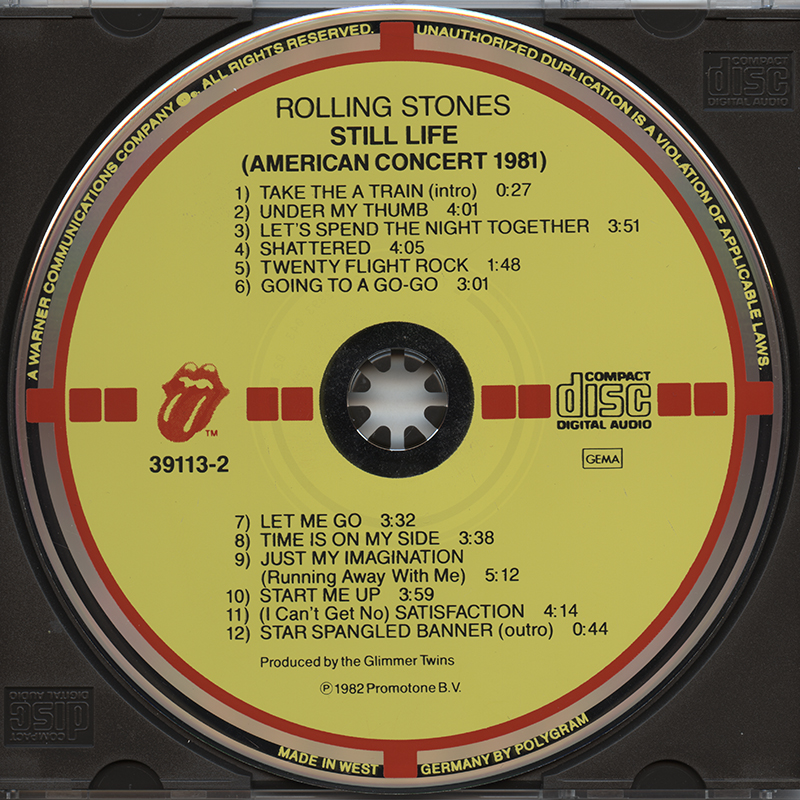
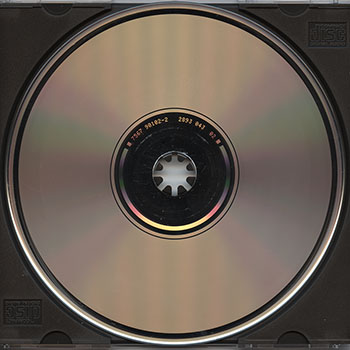
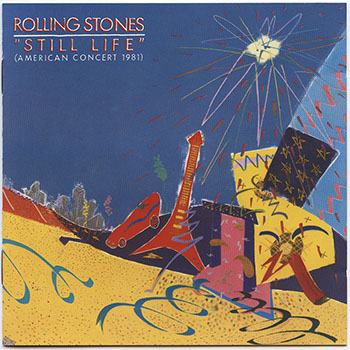
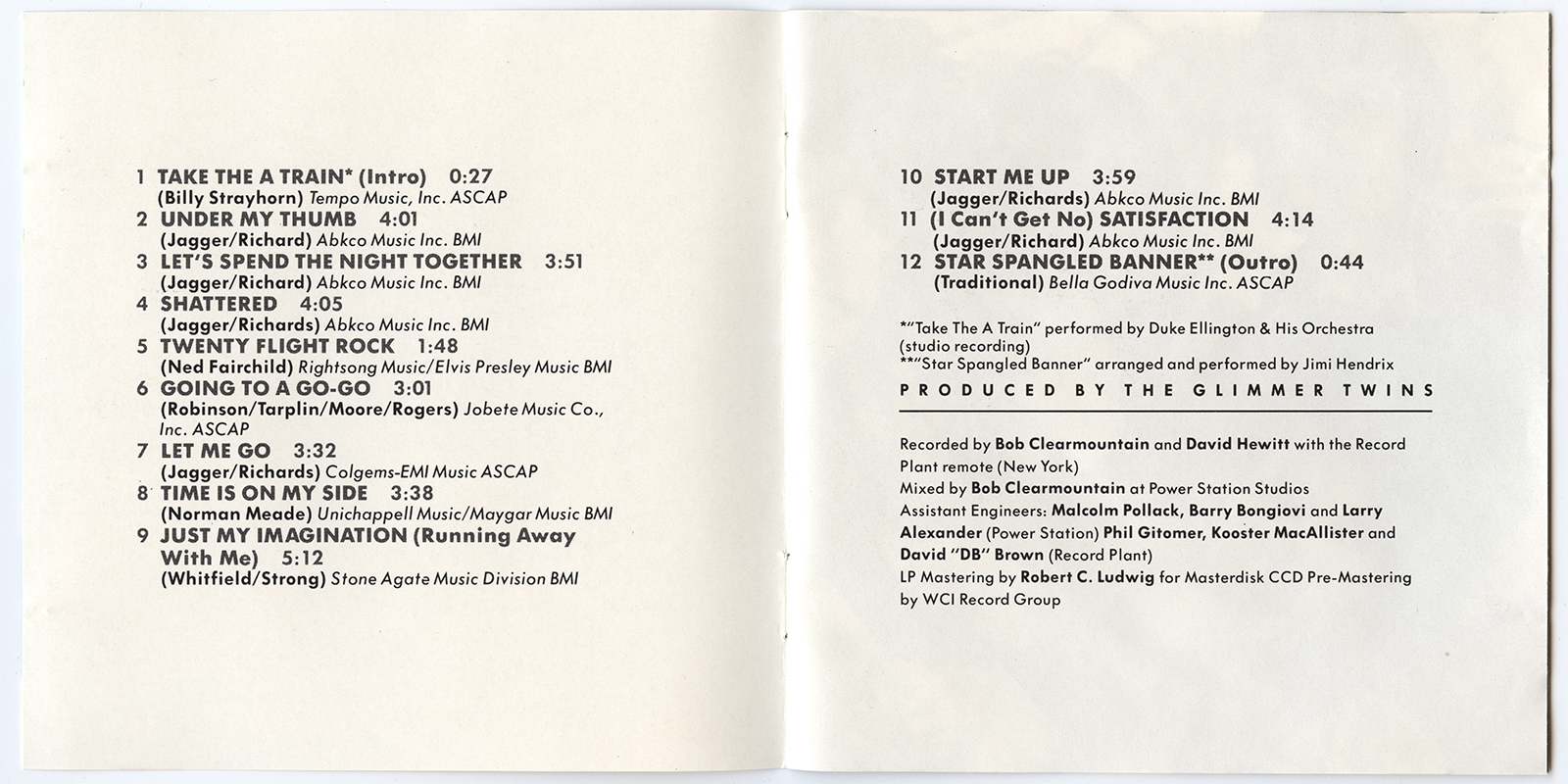
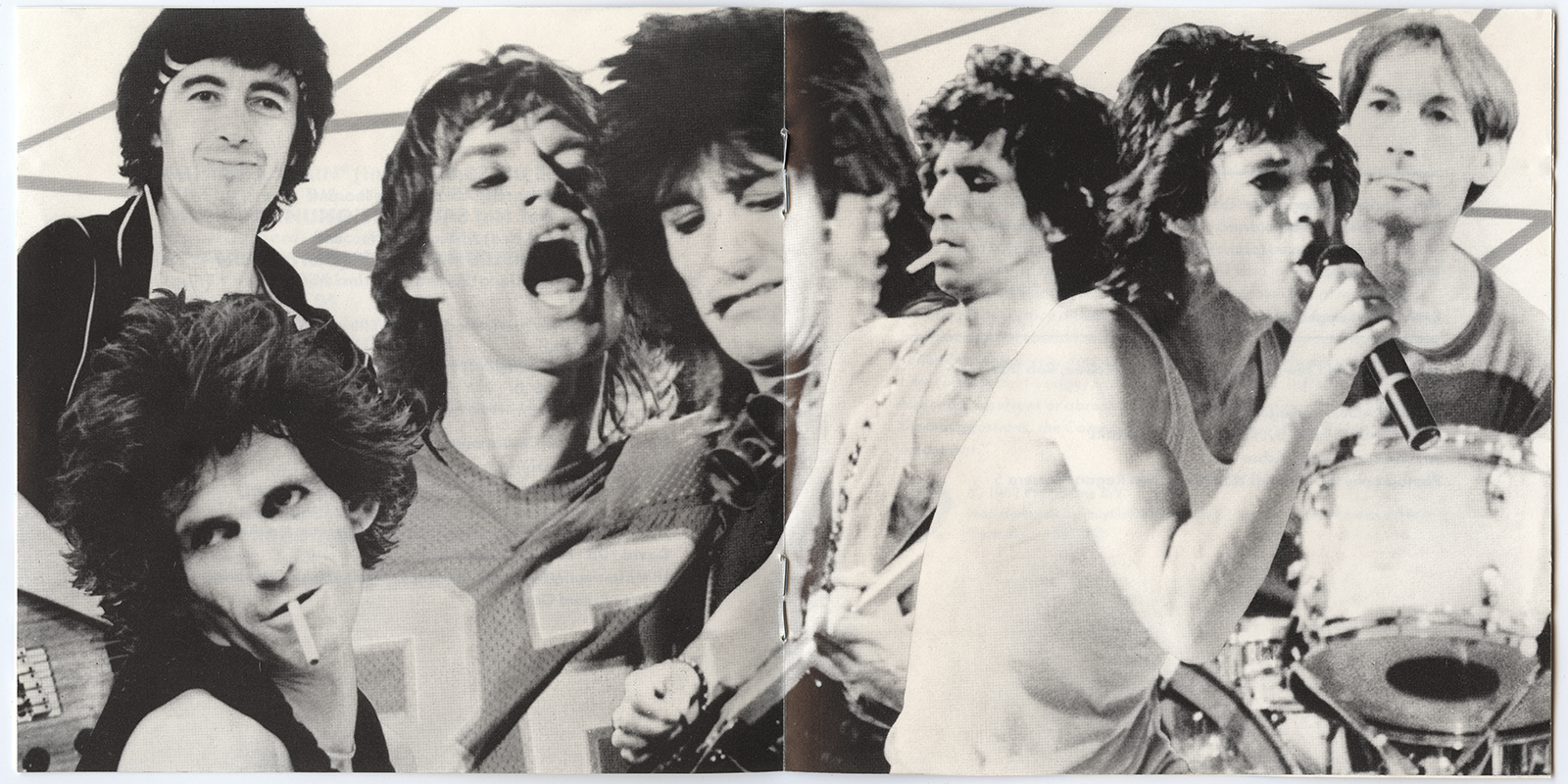
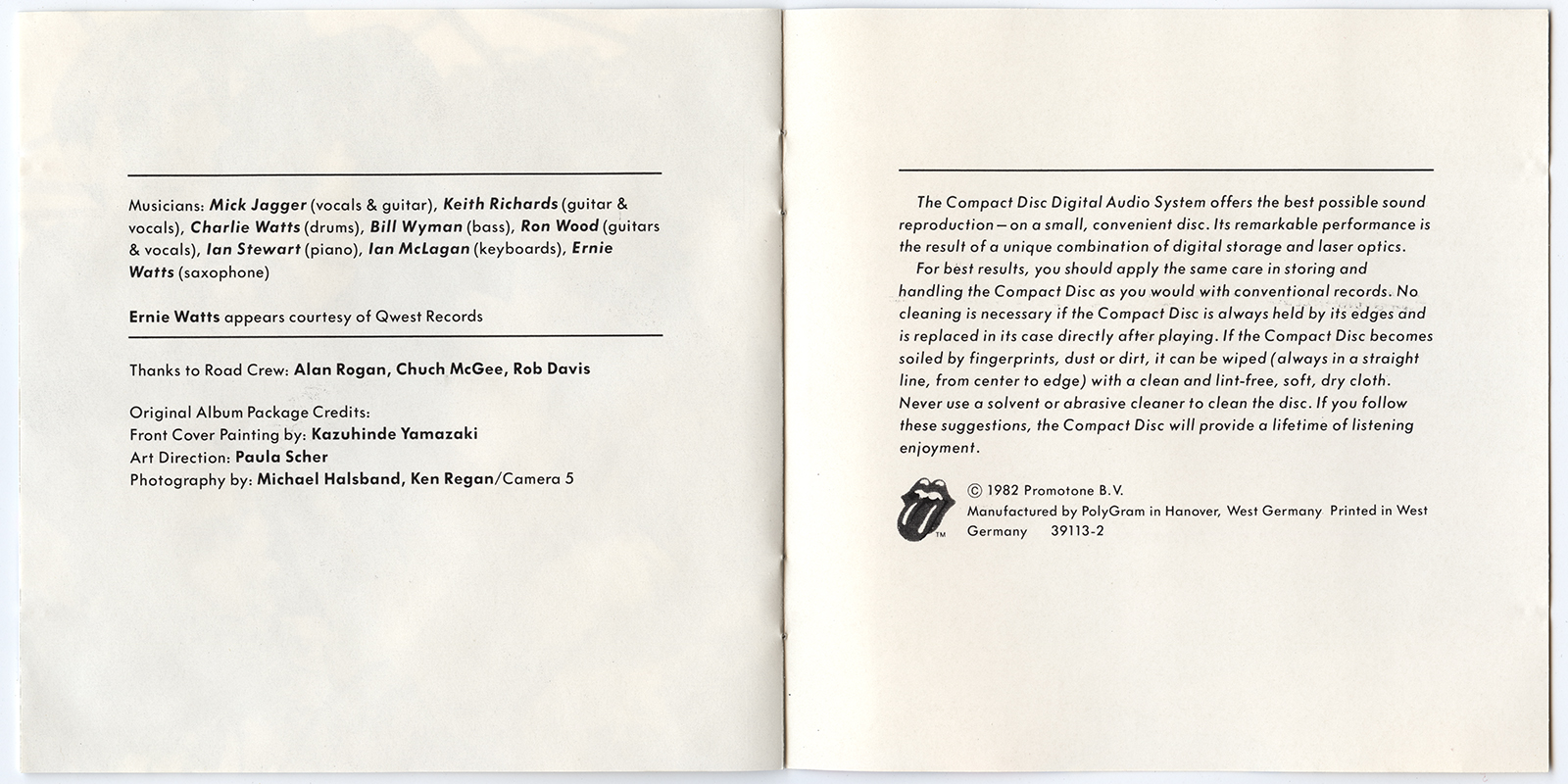
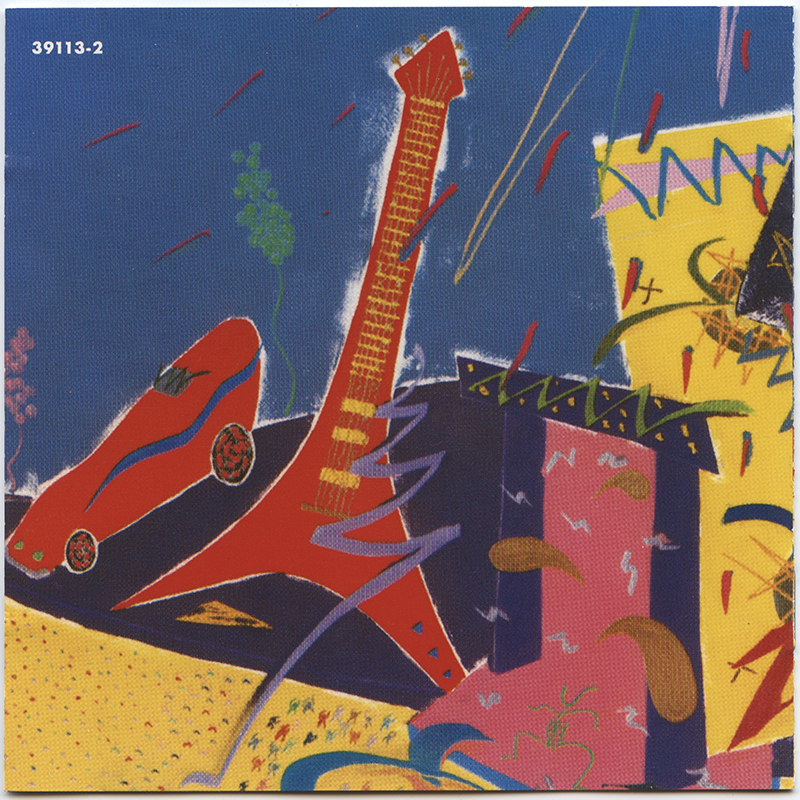
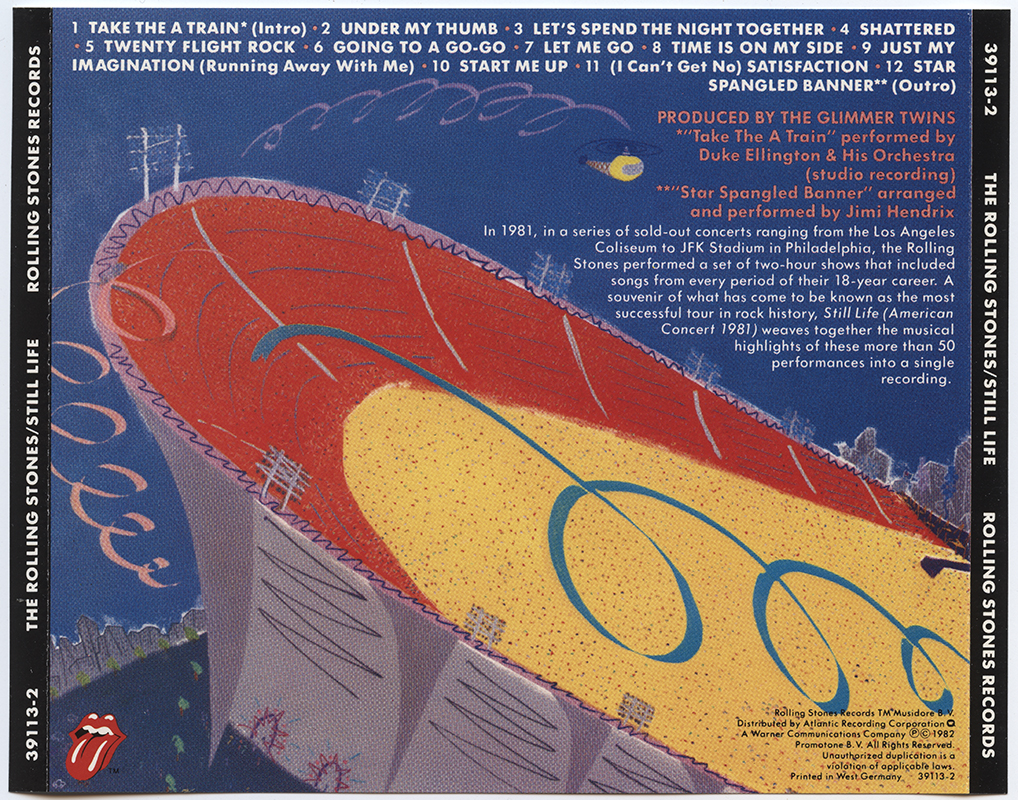
+++


[www.giginjapan.com]
+++


++

+++
Rolling Stones Records CBS CDCBS 450 204 2
Manufactured by CBS-Sony Music Inc. in Japan
Deutsche Erstausgabe 27.11.1986
Matrix-No.: DIDP-10586 11 A1 +++++
+++
+++








+++


[www.giginjapan.com]
+++


++

+++
Re: Stones 1981-1982 Wardrobes
Posted by:
exilestones
()
Date: October 3, 2016 17:13
STILL LIFE
THE POP LIFE
By ROBERT PALMER
Published: June 16, 1982
THE Rolling Stones' American tour last year was the most profitable and widely publicized series of performances in the history of rock-and-roll. Profiteers furtively resold tickets at unheard-of prices, and some of the nation's largest outdoor arenas - the 90,000-seat John F. Kennedy Stadium in Philadelphia, for example - sold out so quickly that second shows had to be added. Daily newspapers in a number of cities gave the arrival of the Stones front-page coverage.
Now Rolling Stones Records has released ''Still Life (American Concert 1981),'' a live album culled from performances on the tour - 2-Hour Show on One Disk.
Anyone who was lucky enough to attend one of the handful of concerts in small theaters that the Stones played on their tour will find the album disappointing. The group's show at the Fox Theater in Atlanta offered crystal-clear sound, concentrated and ferocious playing, and an intense give-and take between band and audience that simply cannot be achieved in stadiums and arenas, where most of ''Still Life'' was recorded. But stadiums and arenas are where the Stones do most of their playing these days, so ''Still Life'' is at least representative.
It is also skillfully edited. The band's two-hour show has been boiled down to one fast-paced disk, and for the most part the songs were imaginatively chosen. One thing that separates the Stones from other rock bands is their buoyant swing, and this rhythmic lift is particularly evident on ''Twenty Flight Rock,'' a rockabilly oldie the band had never recorded.
The old Motown hit ''Going to a Go Go'' was a concert highlight, and during the course of the tour the band radically reworked ''Shattered,'' adding a Memphis-style guitar interlude that transformed it from a rhythmic riff tune into a real song. These numbers and a spirited ''Imagination'' are the new album's high points. Its major disappointments include ''Time Is on My Side,'' in which Keith Richards's shattering guitar breaks and yowling backup vocals have been mixed too low, shortchanged in favor of Mick Jagger's singing, and the obligatory ''Satisfaction.''
As a souvenir of the tour, ''Still Life'' is perfectly adequate, and several selections are positively galvanizing. But it won't persuade anyone who wasn't there that on their best nights the Stones gave some of the most exciting performances of their 20-year career.
++++
THE POP LIFE
By ROBERT PALMER
Published: June 16, 1982
THE Rolling Stones' American tour last year was the most profitable and widely publicized series of performances in the history of rock-and-roll. Profiteers furtively resold tickets at unheard-of prices, and some of the nation's largest outdoor arenas - the 90,000-seat John F. Kennedy Stadium in Philadelphia, for example - sold out so quickly that second shows had to be added. Daily newspapers in a number of cities gave the arrival of the Stones front-page coverage.
Now Rolling Stones Records has released ''Still Life (American Concert 1981),'' a live album culled from performances on the tour - 2-Hour Show on One Disk.
Anyone who was lucky enough to attend one of the handful of concerts in small theaters that the Stones played on their tour will find the album disappointing. The group's show at the Fox Theater in Atlanta offered crystal-clear sound, concentrated and ferocious playing, and an intense give-and take between band and audience that simply cannot be achieved in stadiums and arenas, where most of ''Still Life'' was recorded. But stadiums and arenas are where the Stones do most of their playing these days, so ''Still Life'' is at least representative.
It is also skillfully edited. The band's two-hour show has been boiled down to one fast-paced disk, and for the most part the songs were imaginatively chosen. One thing that separates the Stones from other rock bands is their buoyant swing, and this rhythmic lift is particularly evident on ''Twenty Flight Rock,'' a rockabilly oldie the band had never recorded.
The old Motown hit ''Going to a Go Go'' was a concert highlight, and during the course of the tour the band radically reworked ''Shattered,'' adding a Memphis-style guitar interlude that transformed it from a rhythmic riff tune into a real song. These numbers and a spirited ''Imagination'' are the new album's high points. Its major disappointments include ''Time Is on My Side,'' in which Keith Richards's shattering guitar breaks and yowling backup vocals have been mixed too low, shortchanged in favor of Mick Jagger's singing, and the obligatory ''Satisfaction.''
As a souvenir of the tour, ''Still Life'' is perfectly adequate, and several selections are positively galvanizing. But it won't persuade anyone who wasn't there that on their best nights the Stones gave some of the most exciting performances of their 20-year career.
++++
Re: Stones 1981-1982 Wardrobes
Posted by:
exilestones
()
Date: October 3, 2016 17:15

Still Life was a commercial success going platinum, but was not critically well-received, being admonished for sounding too slick and lacking any rough edges expected in a Rolling Stones performance.
++++
The 1981 North American tour kicked off in late September and wound up in mid December with the band having played to almost 2.2 million fans at 50 concerts, with many of the songs on the album being played live during the band’s two-hour plus show.
The success of this album in Britain was helped by the European tour that began at the end of May in Scotland and ended in Leeds, England at the end of July having played to close to 1.7 million fans.
Re: Stones 1981-1982 Wardrobes
Posted by:
exilestones
()
Date: October 3, 2016 17:15
++++
Still Life, the Rolling Stones' fourth live album, opens with an absolutely savage version of "Under My Thumb." Keith Richards starts it off, hammering out that killer riff as if it were 1965 again, while Charlie Watts slams away with equal fervor. And Mick Jagger tears into the unbridled misogyny of the lyrics ("Now she's the sweetest ... pet in the world") like a man rabid for revenge. As the song progresses, propelled by Watts' deft cymbal touches and some splendid chordal soloing by Keith and Ron Wood, your hopes rise. Have these guys done it at last? Have they made a great live rock & roll record?
Unfortunately, no. Of course, it's no big surprise that Still Life doesn't live up to its ballsy beginning. The Stones' 1981 tour de-emphasized the go-get-'em guitar jams of earlier outings (remember "Midnight Rambler" from Get Yer Ya-Ya's Out?), as well as Jagger's more Dionysian antics. It offered, instead, a good-spirited, unexploitative (long sets, fast encores) rock & roll show. Not flawlessly rendered music — a great show.
And it's the show that Still Life tries to reproduce. You get ten songs, light on the classics and heavy on covers, in the order they were performed. You get Jagger's cross-country stage patter ("Welcome, Virginia.... All right, Chicago!"). You even get the evening's effluvia: Duke Ellington's "Take the 'A' Train" intro, the bang of the fireworks that closed the concert. Yes, it's all there but the ticket stubs, though at times, it's a bit hard to understand why. Tom Wolfe predicted the day when every novel would be referred to as a cordless miniseries; there are moments when Still Life comes off like the first screenless videodisc.
It's hard not to feel that you're missing something during the flaccid flailings that pass for "Satisfaction" here — and, in fact, you are, since hundreds of balloons were dropped into the crowd during this number. And not even Ian Stewart's best barrelhouse piano can save the cover of Eddie Cochran's "Twenty-Flight Rock." "When I get to the top/I'm too tired to rock," indeed. Similarly lackluster is "Start Me Up," which misses the crisp guitar attack and hand percussion of the studio version.
But there are moments of mastery here. "Shattered" loses some of its murkiness and features a fiery Jagger racing through its words with the same intensity he brought to "Neighbours." On "Going to a Go-Go," Jagger and Ron Wood holler lustily together in front of Watts' upon-this-rock-will-I-build-my-band bashing.
"Time Is on My Side" has made the predictable transition from love song ("You come running back") to anthem ("Y'all come running back"). But it's Richards who makes the song work on both levels; that plaintive riff rings even more bittersweet in the echoes of an arena. "Just My Imagination" also showcases some slashing guitar work and an ending on loan from "When the Whip Comes Down." Even "Let Me Go," which needed a Jagger foray into the audience to elicit any kind of crowd response, boasts a respectable Wood-Richards duel.
Yet for all its strengths, Still Life finally comes across as the aural equivalent of a Stones T-shirt, the final item of tour merchandise. But so what? People who get to see the Stones a lot — rock critics, for example — tend to forget that a lot of people don't get to see them at all. That kid who told one reporter in Los Angeles, "Some Girls ... man, that brings back some memories," spoke, I think, for a lot of people. They are going to love this record. The rest of you might prefer to go back and check out 12 X 5.
[www.rollingstone.com]
Still Life, the Rolling Stones' fourth live album, opens with an absolutely savage version of "Under My Thumb." Keith Richards starts it off, hammering out that killer riff as if it were 1965 again, while Charlie Watts slams away with equal fervor. And Mick Jagger tears into the unbridled misogyny of the lyrics ("Now she's the sweetest ... pet in the world") like a man rabid for revenge. As the song progresses, propelled by Watts' deft cymbal touches and some splendid chordal soloing by Keith and Ron Wood, your hopes rise. Have these guys done it at last? Have they made a great live rock & roll record?
Unfortunately, no. Of course, it's no big surprise that Still Life doesn't live up to its ballsy beginning. The Stones' 1981 tour de-emphasized the go-get-'em guitar jams of earlier outings (remember "Midnight Rambler" from Get Yer Ya-Ya's Out?), as well as Jagger's more Dionysian antics. It offered, instead, a good-spirited, unexploitative (long sets, fast encores) rock & roll show. Not flawlessly rendered music — a great show.
And it's the show that Still Life tries to reproduce. You get ten songs, light on the classics and heavy on covers, in the order they were performed. You get Jagger's cross-country stage patter ("Welcome, Virginia.... All right, Chicago!"). You even get the evening's effluvia: Duke Ellington's "Take the 'A' Train" intro, the bang of the fireworks that closed the concert. Yes, it's all there but the ticket stubs, though at times, it's a bit hard to understand why. Tom Wolfe predicted the day when every novel would be referred to as a cordless miniseries; there are moments when Still Life comes off like the first screenless videodisc.
It's hard not to feel that you're missing something during the flaccid flailings that pass for "Satisfaction" here — and, in fact, you are, since hundreds of balloons were dropped into the crowd during this number. And not even Ian Stewart's best barrelhouse piano can save the cover of Eddie Cochran's "Twenty-Flight Rock." "When I get to the top/I'm too tired to rock," indeed. Similarly lackluster is "Start Me Up," which misses the crisp guitar attack and hand percussion of the studio version.
But there are moments of mastery here. "Shattered" loses some of its murkiness and features a fiery Jagger racing through its words with the same intensity he brought to "Neighbours." On "Going to a Go-Go," Jagger and Ron Wood holler lustily together in front of Watts' upon-this-rock-will-I-build-my-band bashing.
"Time Is on My Side" has made the predictable transition from love song ("You come running back") to anthem ("Y'all come running back"). But it's Richards who makes the song work on both levels; that plaintive riff rings even more bittersweet in the echoes of an arena. "Just My Imagination" also showcases some slashing guitar work and an ending on loan from "When the Whip Comes Down." Even "Let Me Go," which needed a Jagger foray into the audience to elicit any kind of crowd response, boasts a respectable Wood-Richards duel.
Yet for all its strengths, Still Life finally comes across as the aural equivalent of a Stones T-shirt, the final item of tour merchandise. But so what? People who get to see the Stones a lot — rock critics, for example — tend to forget that a lot of people don't get to see them at all. That kid who told one reporter in Los Angeles, "Some Girls ... man, that brings back some memories," spoke, I think, for a lot of people. They are going to love this record. The rest of you might prefer to go back and check out 12 X 5.
[www.rollingstone.com]
Re: Stones 1981-1982 Wardrobes
Posted by:
exilestones
()
Date: October 3, 2016 17:20
STILL LIFE (AMERICAN CONCERT 1981)
BOTLEY SMITH’S BLOG
Once the trigger was pulled on Tattoo You‘s final completion and release schedule, the necessary arrangements fell into place for the massive tour that had spawned it. Having got their act reasonably together, Mick & Keith’s mutual disaffection had cooled to a polite ceasefire. They arrived at an understanding - as long as Ronnie could steer clear of debilitating freebase cocaine intake, the Stones could resume right where they left off after their final gig in Canada two years earlier. All gathered and rehearsed for six weeks in summer of ’81 at Long View Farm in North Brookfield, Massachusetts, and ran through a myriad of songs, piecing together a reasonably well-balanced set (building upon their established repertoire from the ’78 shows), which would remain fairly stable for the entire tour.
When the dust cleared, a few more “oldies” (but goldies) had returned, some tunes being played live for the first time or sporting new arrangements. Everything from It’s Only Rock ‘n Roll & Black and Blue was still firmly off the table. Stalwart ol’ Stu was returning on grand piano, as was “Mac” on electric keyboards, but other players dropped by to jam as well, including David Sancious (of the E Street Band) and a former sideman for the Allman Brothers, one Chuck Leavell. A couple of weeks into the tour, they were joined by accomplished session saxophonist Ernie Watts (“no relation”) on most tracks and also occasionally by Bobby Keys who, despite his sterling contributions to Emotional Rescue, was still working his way back into Jagger’s favour after the unseemly fallout from drug excesses that led to his termination from the ’73 tour. None of Keys’ performances made it to Still Life and no one yet realized he was truly to stay on for good — he would not formally return to the officially announced lineup of players until ’82.
There were no jumbo-sized CCTV screens yet in most of these American stadia where the tour was booked, and so, in order to be visible from across an enormous outdoor football pitch, the band made some concessions to the traditional garb of these sports-based venues. Jagger chose garish colours over outlandish NFL-styled leggings as a means to an end: so that anyone looking could spot his location and movements from the cheap seats. Hal Ashby’s film Let’s Spend the Night Together depicts the dusky sunlit afternoon of one such open-air stadium show in all its jaw-dropping vastness, where the band seem nearly swallowed up by the scale of the event. They had learned to expect this from the outdoor ’78 shows, however, and Jagger worked up the idea of a raked-stage set design that could maximize visibility in these settings to combat this dwarfing of the players. Charlie Watts, being a former graphic design student, also took an interest in the layout, keen to give the band additional visual appeal. As Charlie later put it in discussing the vagaries of stadium rock, “you need a bit of theatre”, and the Stones certainly excelled at that.
The illustrated scrim on either side of the stage took on a primary-colour Americana theme, designed by Kazuhide Yamazari and depicting a stylized electric guitar, a flashy sports car, the star-spangled banner, and a turntable. This was re-worked for the Still Life album artwork to wrap around the entire front and back cover: when folded out, the impressionistic figures dominate the illustrated stadium bowl, coming to ‘life’ and rising into the radiant sunshine (only a single brown stick-figure person — a jumping jack, of sorts — is depicted on the stage). At key moments, the band released balloons, let off fireworks, and bathed the stage with brilliantly coloured light to thrill the crowd. Jagger even climbed into a cherry-picker crane, for the surprise conclusion of the main set.
For 1981, this was ground-breaking stuff, considering most bands showed up with a few PAR cans and follow-spots for lighting and no staging other than bare risers on scaffold. The indoor shows mounted later in the tour (in cities where weather was becoming too inclement for an outdoor setting) were arguably even more technically ambitious, with the drum riser rotating outwards to play “in the round” and a wraparound runway for the now-entirely-wireless players surrounding it. This was a logical continuation from the flowering “lotus stage” of 1975, but fully incorporating the technical improvements of 1980s gear.
After a mood-setting Duke Ellington intro, “Under My Thumb” starts things off in highly energetic fashion, with Brian Jones’ marimba line transposed into a hard-rocking Keef riff, doubled on organ and interwoven with Ronnie’s answering licks. There’s definitely an overdubbed third guitar adding reinforcement to Keith’s part, though it’s barely audible and mixed quietly to centre. The arrangement is long on repetition, but it feels briskly efficient compared to the slinky original Aftermath cut (and it skips the “Her eyes are just kept to herself - While I can still look at someone else” verse entirely). Opening the show with this familiar yet re-worked classic was a brilliant move, allowing Mick to stretch out and gallavant while the guitarists strode forth down the ramp towards adorning punters. The crowd even claps in time for the whole song.
Another mid-sixties chestnut “Let’s Spend the Night Together” follows after Mick’s introduction, welcoming those watching the tour-capping Hampton Coliseum pay-per-view special (which we’ll cover in depth later) at home “drinkin’ a few beers, smokin’ a few joints”. His voice is a little hoarse, and the wireless mic a bit crackly, but the two pianos and guitarists (again with a little double-Keith embellishment in post-production) absolutely shine here, particularly Ronnie. Next is the more recent calling card “Shattered”, which they take at a furious clip. Again, Ronnie is on fire here, taking a beautiful solo and contributing to those charming call-and-response backup vocals at the conclusion with Keith and Mac. That glorious phased guitar riff is just insatiable!
Eddie Cochran’s “Twenty Flight Rock” is next, quite a fun choice for a cover (notably, one P. McCartney remembered the words well enough to be let into the Quarrymen), which the Stones never recorded in the studio. Once again, the other players do a great job of matching Keith’s knuckle-whitening pace. On most dates of the tour, it was played in a medley with “Going to a Go-Go” but they specifically chose a show where the two were played separately to get clean tops and tails recorded for the album. I love both songs very much, as they were important salvos in the 50s rock ‘n roll revolution. The overdubbed “Go-Go” vocals really shine here, rivalling the Miracles’ original performance, and Mick’s lusty lead is entirely his own. Oh, yeah — how about that sax!
For the first time, the Stones promoted their new live album with a single, and shrewdly, this was the track selected. In keeping with their long tradition of chart success covering the Motown catalogue, it fared pretty well and had a promotional video released for the fledgling MTV market. Its B-side was a non-album recording of “Beast of Burden” taken from the third and last show in Illinois (where the Still Life “Start Me Up” was also recorded), which makes an interesting listen thanks to its bouncy tempo and Watts’ slick sax licks. Unfortunately, the chorus vocals are a little flat and Ronnie’s solo, although nice, doesn’t quite take off the way it should. Nevertheless it was in contention for the album’s final running order, as it appears to have received a cowbell overdub and fancy vocal delay treatment (“put me out, put me out!”) in the mix down stage. It would also later appear on the Flashpoint Collectibles and Rarities 1971–2003 anthologies. Mick rants “I don’t want you to wash my clothes, I don’t want you to change my baby’s Pampers, I don’t want you to come in my kitchen, I don’t want you to f*ck around with it” and it sounds like everyone’s having a reasonably fun time.
The Still Life recording of “Time Is on My Side” also came out at the end of summer ’81 in a rather fetching picture sleeve, with back-and-white photos taken by Ken Regan of a contemporary club gig. It had its own video promo, too, with archival shots of the band intercut with the Hampton footage by then-rising star Austrian video directors Rudi Dolezal and Hannes Rossacher. The 12? single version put the album versions of “Twenty Flight Rock” and “Under My Thumb” together as one seamless B-side. It’s a great arrangement of “Time”, too, with Keith doing a manful job on backup vocals and holding down the rhythm.
Side Two of the LP starts with “Let Me Go”, a real workout for Jagger, who would usually sing the extended final chorus on a whirlwind sprint out into the crowd, on an extended platform leading from the stage, or just mingling out on the ground surrounded by bodyguards. Once again, the pace is furious, and the guitars bitingly nasty. The highlight of the second side, however, is an intense, extended arrangement of “Just My Imagination” that would stretch out for over nine minutes on most nights. It’s judiciously edited down here, hitting only the highlights. Really very tasty, and once again Watts’ sax contribution is essential.
This album was primarily conceived to provide another tour souvenir; its title an indication that this was the American concert experience, finished in time to be sold along with T-shirts and badges to European audiences on the ’82 leg. It cross-cuts between shows freely, name-checking different cities along the way. The feel is taut, with Jagger’s voice (usually overdubbed but certainly live on the Hampton tracks) doing a reasonable job of meshing well against the players’ weave. There are a few unobtrusive patch-ups in the guitar department, Keith’s additions poking their way in here and there to reinforce the main riff, but the solos are all thrillingly fresh and in-the-moment.
Most of these basic arrangements became canonical for subsequent tours, including the revitalized “Satisfaction”, which they definitively knocked into tour-ready shape after a five-year absence from the setlist since opening the show at Knebworth ’76. It had never been captured in a form considered worthy of live album release before. Here, it sounds like it had never left, and the crowd receives it as rapturously as ever. In its afterglow, the fireworks display blasts over Hendrix’s Woodstock performance of the national anthem. Bombast, defined!
Compared to Love You Live, this is a lot better in almost every respect — it’s even great compared to the ragged sloppiness of Some Girls Live in Texas ’78. For all the slagging-off that Still Life gets, it’s certainly more professional than the out-of-tune, vocally incompetent, floundering mess that the ’70s Stones shows often were. Despite a slightly muddy mix (Bob Clearmountain had yet to figure out how to really make these live recordings pop), and a few percussion overdubs that don’t quite sit correctly, the only real problem with Still Life is its subsequent duplication and recapitulation. Not only does the home video Let’s Spend the Night Together re-create the trick of cross-cutting from show to show, it has this same version of “Satisfaction” and outro (only longer). The Hampton Coliseum (Live 1981) release contains the same versions of “Let’s Spend the Night Together”, “Shattered” and “Time Is on My Side”, as well as similar renditions of the other tracks. All of these were rehashed AGAIN by the Live at Leeds Roundhay Park 1982 archive show. There are subtle differences, which we’ll discuss soon, but the fact is that the ’81-’82 leg is extensively documented by other official releases, for anyone who cares to dive in.
So this album, for all its fine points, is now an artifact among artifacts. The harsh criticism it routinely receives is undeserved, but if you want some insight into how well the band could play in this period, your best bet is to start elsewhere. If you grew up with it, though, the nostalgia factor may persuade you to revisit and rediscover its hidden charms.
[botley.wordpress.com]
Edited 1 time(s). Last edit at 2016-10-03 17:20 by exilestones.
BOTLEY SMITH’S BLOG
Once the trigger was pulled on Tattoo You‘s final completion and release schedule, the necessary arrangements fell into place for the massive tour that had spawned it. Having got their act reasonably together, Mick & Keith’s mutual disaffection had cooled to a polite ceasefire. They arrived at an understanding - as long as Ronnie could steer clear of debilitating freebase cocaine intake, the Stones could resume right where they left off after their final gig in Canada two years earlier. All gathered and rehearsed for six weeks in summer of ’81 at Long View Farm in North Brookfield, Massachusetts, and ran through a myriad of songs, piecing together a reasonably well-balanced set (building upon their established repertoire from the ’78 shows), which would remain fairly stable for the entire tour.
When the dust cleared, a few more “oldies” (but goldies) had returned, some tunes being played live for the first time or sporting new arrangements. Everything from It’s Only Rock ‘n Roll & Black and Blue was still firmly off the table. Stalwart ol’ Stu was returning on grand piano, as was “Mac” on electric keyboards, but other players dropped by to jam as well, including David Sancious (of the E Street Band) and a former sideman for the Allman Brothers, one Chuck Leavell. A couple of weeks into the tour, they were joined by accomplished session saxophonist Ernie Watts (“no relation”) on most tracks and also occasionally by Bobby Keys who, despite his sterling contributions to Emotional Rescue, was still working his way back into Jagger’s favour after the unseemly fallout from drug excesses that led to his termination from the ’73 tour. None of Keys’ performances made it to Still Life and no one yet realized he was truly to stay on for good — he would not formally return to the officially announced lineup of players until ’82.
There were no jumbo-sized CCTV screens yet in most of these American stadia where the tour was booked, and so, in order to be visible from across an enormous outdoor football pitch, the band made some concessions to the traditional garb of these sports-based venues. Jagger chose garish colours over outlandish NFL-styled leggings as a means to an end: so that anyone looking could spot his location and movements from the cheap seats. Hal Ashby’s film Let’s Spend the Night Together depicts the dusky sunlit afternoon of one such open-air stadium show in all its jaw-dropping vastness, where the band seem nearly swallowed up by the scale of the event. They had learned to expect this from the outdoor ’78 shows, however, and Jagger worked up the idea of a raked-stage set design that could maximize visibility in these settings to combat this dwarfing of the players. Charlie Watts, being a former graphic design student, also took an interest in the layout, keen to give the band additional visual appeal. As Charlie later put it in discussing the vagaries of stadium rock, “you need a bit of theatre”, and the Stones certainly excelled at that.
The illustrated scrim on either side of the stage took on a primary-colour Americana theme, designed by Kazuhide Yamazari and depicting a stylized electric guitar, a flashy sports car, the star-spangled banner, and a turntable. This was re-worked for the Still Life album artwork to wrap around the entire front and back cover: when folded out, the impressionistic figures dominate the illustrated stadium bowl, coming to ‘life’ and rising into the radiant sunshine (only a single brown stick-figure person — a jumping jack, of sorts — is depicted on the stage). At key moments, the band released balloons, let off fireworks, and bathed the stage with brilliantly coloured light to thrill the crowd. Jagger even climbed into a cherry-picker crane, for the surprise conclusion of the main set.
For 1981, this was ground-breaking stuff, considering most bands showed up with a few PAR cans and follow-spots for lighting and no staging other than bare risers on scaffold. The indoor shows mounted later in the tour (in cities where weather was becoming too inclement for an outdoor setting) were arguably even more technically ambitious, with the drum riser rotating outwards to play “in the round” and a wraparound runway for the now-entirely-wireless players surrounding it. This was a logical continuation from the flowering “lotus stage” of 1975, but fully incorporating the technical improvements of 1980s gear.
After a mood-setting Duke Ellington intro, “Under My Thumb” starts things off in highly energetic fashion, with Brian Jones’ marimba line transposed into a hard-rocking Keef riff, doubled on organ and interwoven with Ronnie’s answering licks. There’s definitely an overdubbed third guitar adding reinforcement to Keith’s part, though it’s barely audible and mixed quietly to centre. The arrangement is long on repetition, but it feels briskly efficient compared to the slinky original Aftermath cut (and it skips the “Her eyes are just kept to herself - While I can still look at someone else” verse entirely). Opening the show with this familiar yet re-worked classic was a brilliant move, allowing Mick to stretch out and gallavant while the guitarists strode forth down the ramp towards adorning punters. The crowd even claps in time for the whole song.
Another mid-sixties chestnut “Let’s Spend the Night Together” follows after Mick’s introduction, welcoming those watching the tour-capping Hampton Coliseum pay-per-view special (which we’ll cover in depth later) at home “drinkin’ a few beers, smokin’ a few joints”. His voice is a little hoarse, and the wireless mic a bit crackly, but the two pianos and guitarists (again with a little double-Keith embellishment in post-production) absolutely shine here, particularly Ronnie. Next is the more recent calling card “Shattered”, which they take at a furious clip. Again, Ronnie is on fire here, taking a beautiful solo and contributing to those charming call-and-response backup vocals at the conclusion with Keith and Mac. That glorious phased guitar riff is just insatiable!
Eddie Cochran’s “Twenty Flight Rock” is next, quite a fun choice for a cover (notably, one P. McCartney remembered the words well enough to be let into the Quarrymen), which the Stones never recorded in the studio. Once again, the other players do a great job of matching Keith’s knuckle-whitening pace. On most dates of the tour, it was played in a medley with “Going to a Go-Go” but they specifically chose a show where the two were played separately to get clean tops and tails recorded for the album. I love both songs very much, as they were important salvos in the 50s rock ‘n roll revolution. The overdubbed “Go-Go” vocals really shine here, rivalling the Miracles’ original performance, and Mick’s lusty lead is entirely his own. Oh, yeah — how about that sax!
For the first time, the Stones promoted their new live album with a single, and shrewdly, this was the track selected. In keeping with their long tradition of chart success covering the Motown catalogue, it fared pretty well and had a promotional video released for the fledgling MTV market. Its B-side was a non-album recording of “Beast of Burden” taken from the third and last show in Illinois (where the Still Life “Start Me Up” was also recorded), which makes an interesting listen thanks to its bouncy tempo and Watts’ slick sax licks. Unfortunately, the chorus vocals are a little flat and Ronnie’s solo, although nice, doesn’t quite take off the way it should. Nevertheless it was in contention for the album’s final running order, as it appears to have received a cowbell overdub and fancy vocal delay treatment (“put me out, put me out!”) in the mix down stage. It would also later appear on the Flashpoint Collectibles and Rarities 1971–2003 anthologies. Mick rants “I don’t want you to wash my clothes, I don’t want you to change my baby’s Pampers, I don’t want you to come in my kitchen, I don’t want you to f*ck around with it” and it sounds like everyone’s having a reasonably fun time.
The Still Life recording of “Time Is on My Side” also came out at the end of summer ’81 in a rather fetching picture sleeve, with back-and-white photos taken by Ken Regan of a contemporary club gig. It had its own video promo, too, with archival shots of the band intercut with the Hampton footage by then-rising star Austrian video directors Rudi Dolezal and Hannes Rossacher. The 12? single version put the album versions of “Twenty Flight Rock” and “Under My Thumb” together as one seamless B-side. It’s a great arrangement of “Time”, too, with Keith doing a manful job on backup vocals and holding down the rhythm.
Side Two of the LP starts with “Let Me Go”, a real workout for Jagger, who would usually sing the extended final chorus on a whirlwind sprint out into the crowd, on an extended platform leading from the stage, or just mingling out on the ground surrounded by bodyguards. Once again, the pace is furious, and the guitars bitingly nasty. The highlight of the second side, however, is an intense, extended arrangement of “Just My Imagination” that would stretch out for over nine minutes on most nights. It’s judiciously edited down here, hitting only the highlights. Really very tasty, and once again Watts’ sax contribution is essential.
This album was primarily conceived to provide another tour souvenir; its title an indication that this was the American concert experience, finished in time to be sold along with T-shirts and badges to European audiences on the ’82 leg. It cross-cuts between shows freely, name-checking different cities along the way. The feel is taut, with Jagger’s voice (usually overdubbed but certainly live on the Hampton tracks) doing a reasonable job of meshing well against the players’ weave. There are a few unobtrusive patch-ups in the guitar department, Keith’s additions poking their way in here and there to reinforce the main riff, but the solos are all thrillingly fresh and in-the-moment.
Most of these basic arrangements became canonical for subsequent tours, including the revitalized “Satisfaction”, which they definitively knocked into tour-ready shape after a five-year absence from the setlist since opening the show at Knebworth ’76. It had never been captured in a form considered worthy of live album release before. Here, it sounds like it had never left, and the crowd receives it as rapturously as ever. In its afterglow, the fireworks display blasts over Hendrix’s Woodstock performance of the national anthem. Bombast, defined!
Compared to Love You Live, this is a lot better in almost every respect — it’s even great compared to the ragged sloppiness of Some Girls Live in Texas ’78. For all the slagging-off that Still Life gets, it’s certainly more professional than the out-of-tune, vocally incompetent, floundering mess that the ’70s Stones shows often were. Despite a slightly muddy mix (Bob Clearmountain had yet to figure out how to really make these live recordings pop), and a few percussion overdubs that don’t quite sit correctly, the only real problem with Still Life is its subsequent duplication and recapitulation. Not only does the home video Let’s Spend the Night Together re-create the trick of cross-cutting from show to show, it has this same version of “Satisfaction” and outro (only longer). The Hampton Coliseum (Live 1981) release contains the same versions of “Let’s Spend the Night Together”, “Shattered” and “Time Is on My Side”, as well as similar renditions of the other tracks. All of these were rehashed AGAIN by the Live at Leeds Roundhay Park 1982 archive show. There are subtle differences, which we’ll discuss soon, but the fact is that the ’81-’82 leg is extensively documented by other official releases, for anyone who cares to dive in.
So this album, for all its fine points, is now an artifact among artifacts. The harsh criticism it routinely receives is undeserved, but if you want some insight into how well the band could play in this period, your best bet is to start elsewhere. If you grew up with it, though, the nostalgia factor may persuade you to revisit and rediscover its hidden charms.
[botley.wordpress.com]
Edited 1 time(s). Last edit at 2016-10-03 17:20 by exilestones.
Re: Stones 1981-1982 Wardrobes
Posted by:
exilestones
()
Date: October 3, 2016 17:23
+++++
"I remember partying hard with "Still Life" back in the 1980s. For us new fans who went to the concert, this album sealed the deal and rocked at every party throughout high school!"
+++++

STILL LIFE
Imitating a punk band? Hmm... So it's danceable, but there's not a lot of musical activity going on.
Best song: SHATTERED
Track listing: 1) Intro (Take The 'A' Train); 2) Under My Thumb; 3) Let's Spend The Night Together; 4) Shattered; 5) Twenty Flight Rock; 6) Going To A Go-Go; 7) Let Me Go; 8) Time Is On My Side; 9) Just My Imagination (Running Away With Me); 10) Start Me Up; 11) (I Can't Get No) Satisfaction; 12) Outro (Star Spangled Banner).
Live again, from the 1981 American tour this time. Hailed by many as the worst Stones' attempt at a live album, it probably is their worst attempt at a live album; but as far as I see it, the Stones have never put out a truly wretched live album, so it's actually not that bad - it's just seriously disappointing by the band's own standards, particularly after the wonderful studio record that preceded it.
What distinguishes Still Life from all the other live albums is: (a) the speed - most of the slow songs are played at a fast tempo, and most of the fast songs are played at a breakneck tempo, and this, first of all, gives the impression of ending up the album too fast, second, adds little variety to the proceedings; (b) Mick's singing is even worse than on Love You Live, since, let's face the fact, he really cared for showcasing his penis far more than his singing voice on that tour. The idea was not to dabble in nostalgia - the idea was to kick as much ass as possible, and according to Mick's "newly-found punk personality", he never really needed hitting the right notes as long as he sounded rabid and aggressive. Whether he managed to sound sincere is another matter - apparently, Mick either forgot that cheap posing doesn't equal heartfelt aggression, or he just considered all the punks to be poseurs and creeps. Personally, I'd opt for the latter - wonderful poseur as Mr J is, he could have easily mistaken the entire punk movement for nothing but a gigantic marketing ploy (well, to a certain extent, it was, but that's another, and a widely different, story).
That said, if you omit these peculiarities and the entire punk/non-punk philosophy and throw away your biases and just dig that groovy sound, you'll find yourself tapping your feet and playing air guitar in no time, as should be expected from a Stones concert, of course. In particular, the newer hits (from the last three studio albums) rock mercilessly. In fact, this one has my favourite version of both 'Shattered' and 'Just My Imagination', especially 'Shattered' - I just adore these 'ah! shadoobie''s when they come to life on stage. Don't get me wrong: the song was good in the studio what with all the frigged-up guitar sound, but on stage Keith just slaps out the rhythm like there was no tomorrow, and the adrenaline keeps pushing up, up, up, up, up! To live in this town you must be tough tough tough tough tough... er, sorry, where was I? Oh, yes. I was just wanting to admit that 'Let Me Go' couldn't even dream of becoming such a ferocious treat while resting on Emotional Rescue. Where's the laziness and the dimness of the original performance? All the stops are pulled, and Keith and Ronnie transform the song into a steamin', no-holds-barred rock'n'roll train. The opening and closing choo-choo chords alone are worth a fortune.
'Start Me Up' trashes and bashes just as good - the version here is very similar to the studio one, though (for contrast, as can be witnessed on the Let's Spend The Night Together video, even most of the fast numbers on that album are sped up, so that 'Hang Fire' and 'Neighbours' roll by faster than the average Ramones number), and could probably have been replaced by some lesser, not-necessarily-having-a-hit-status song.
For the old time fans, they include some oldies, also done in a different manner. 'Under My Thumb' showcases its great riff with a clearty of sound never achieved on Got Live, and Keith punctuates the riff as well as possible. However, 'Let's Spend The Night Together', unfortunately, just doesn't hold together so well without the piano part (there is some piano in the background, played by Ian Stewart, I suppose, but it's practically unheard in the mix), although substituting piano chords with screeching guitar lines was an interesting experiment. Problem is, Mr Mickey utterly ruins the song - arguably, out of all the numbers on this album this almost immaculate pop masterpiece is the one that suffers the most from his Vocal Butchery.
The obligatory closing 'Satisfaction' (go figure!) is utterly forgettable unless for the oddest reason on Earth this happens to be your first exposure to the song; but the obligatory 'bonus performances', i.e. the two covers on here ('Twenty Flight Rock' and 'Going To A Go-Go'; notice how just about every Stones live album includes at least one or two cover songs that haven't been officially released on a studio album? Smart marketing move from Jagger again, I'll warrant) are a fascinating listen and take my top spot along with 'Shattered' and 'Let Me Go'. In fact, on 'Going To A Go-Go', just for once on the entire album, Jagger sounds like he's really in here for the fun of it and not just because he needs to support his raunchy image. Although, yes, I forgot to mention that they do 'Time Is On My Side', too, where Mick also tries to sound sincere and moving, trying to turn the song from a simple love ballad into an anthemic showcase of the band's vitality, but he overdoes it a bit anyway. Not for my taste.
Overall, like I said, this hardly ranks among their better live efforts, and the accompanying video (see the review), apart from a few moments, is plain atrocious by the usual Stones' standards; but without the video line this is still eminently listenable. Old farts trying to pass themselves for young punks, that's what this one is all about - but let us try to abstract ourselves from the Stones' age at the time, or from musical reality at the time, and you'll find yourself drawn far closer to the record than you ever thought you would be able to.
[starling.rinet.ru]



+++++


"I remember partying hard with "Still Life" back in the 1980s. For us new fans who went to the concert, this album sealed the deal and rocked at every party throughout high school!"
+++++

STILL LIFE
Imitating a punk band? Hmm... So it's danceable, but there's not a lot of musical activity going on.
Best song: SHATTERED
Track listing: 1) Intro (Take The 'A' Train); 2) Under My Thumb; 3) Let's Spend The Night Together; 4) Shattered; 5) Twenty Flight Rock; 6) Going To A Go-Go; 7) Let Me Go; 8) Time Is On My Side; 9) Just My Imagination (Running Away With Me); 10) Start Me Up; 11) (I Can't Get No) Satisfaction; 12) Outro (Star Spangled Banner).
Live again, from the 1981 American tour this time. Hailed by many as the worst Stones' attempt at a live album, it probably is their worst attempt at a live album; but as far as I see it, the Stones have never put out a truly wretched live album, so it's actually not that bad - it's just seriously disappointing by the band's own standards, particularly after the wonderful studio record that preceded it.
What distinguishes Still Life from all the other live albums is: (a) the speed - most of the slow songs are played at a fast tempo, and most of the fast songs are played at a breakneck tempo, and this, first of all, gives the impression of ending up the album too fast, second, adds little variety to the proceedings; (b) Mick's singing is even worse than on Love You Live, since, let's face the fact, he really cared for showcasing his penis far more than his singing voice on that tour. The idea was not to dabble in nostalgia - the idea was to kick as much ass as possible, and according to Mick's "newly-found punk personality", he never really needed hitting the right notes as long as he sounded rabid and aggressive. Whether he managed to sound sincere is another matter - apparently, Mick either forgot that cheap posing doesn't equal heartfelt aggression, or he just considered all the punks to be poseurs and creeps. Personally, I'd opt for the latter - wonderful poseur as Mr J is, he could have easily mistaken the entire punk movement for nothing but a gigantic marketing ploy (well, to a certain extent, it was, but that's another, and a widely different, story).
That said, if you omit these peculiarities and the entire punk/non-punk philosophy and throw away your biases and just dig that groovy sound, you'll find yourself tapping your feet and playing air guitar in no time, as should be expected from a Stones concert, of course. In particular, the newer hits (from the last three studio albums) rock mercilessly. In fact, this one has my favourite version of both 'Shattered' and 'Just My Imagination', especially 'Shattered' - I just adore these 'ah! shadoobie''s when they come to life on stage. Don't get me wrong: the song was good in the studio what with all the frigged-up guitar sound, but on stage Keith just slaps out the rhythm like there was no tomorrow, and the adrenaline keeps pushing up, up, up, up, up! To live in this town you must be tough tough tough tough tough... er, sorry, where was I? Oh, yes. I was just wanting to admit that 'Let Me Go' couldn't even dream of becoming such a ferocious treat while resting on Emotional Rescue. Where's the laziness and the dimness of the original performance? All the stops are pulled, and Keith and Ronnie transform the song into a steamin', no-holds-barred rock'n'roll train. The opening and closing choo-choo chords alone are worth a fortune.
'Start Me Up' trashes and bashes just as good - the version here is very similar to the studio one, though (for contrast, as can be witnessed on the Let's Spend The Night Together video, even most of the fast numbers on that album are sped up, so that 'Hang Fire' and 'Neighbours' roll by faster than the average Ramones number), and could probably have been replaced by some lesser, not-necessarily-having-a-hit-status song.
For the old time fans, they include some oldies, also done in a different manner. 'Under My Thumb' showcases its great riff with a clearty of sound never achieved on Got Live, and Keith punctuates the riff as well as possible. However, 'Let's Spend The Night Together', unfortunately, just doesn't hold together so well without the piano part (there is some piano in the background, played by Ian Stewart, I suppose, but it's practically unheard in the mix), although substituting piano chords with screeching guitar lines was an interesting experiment. Problem is, Mr Mickey utterly ruins the song - arguably, out of all the numbers on this album this almost immaculate pop masterpiece is the one that suffers the most from his Vocal Butchery.
The obligatory closing 'Satisfaction' (go figure!) is utterly forgettable unless for the oddest reason on Earth this happens to be your first exposure to the song; but the obligatory 'bonus performances', i.e. the two covers on here ('Twenty Flight Rock' and 'Going To A Go-Go'; notice how just about every Stones live album includes at least one or two cover songs that haven't been officially released on a studio album? Smart marketing move from Jagger again, I'll warrant) are a fascinating listen and take my top spot along with 'Shattered' and 'Let Me Go'. In fact, on 'Going To A Go-Go', just for once on the entire album, Jagger sounds like he's really in here for the fun of it and not just because he needs to support his raunchy image. Although, yes, I forgot to mention that they do 'Time Is On My Side', too, where Mick also tries to sound sincere and moving, trying to turn the song from a simple love ballad into an anthemic showcase of the band's vitality, but he overdoes it a bit anyway. Not for my taste.
Overall, like I said, this hardly ranks among their better live efforts, and the accompanying video (see the review), apart from a few moments, is plain atrocious by the usual Stones' standards; but without the video line this is still eminently listenable. Old farts trying to pass themselves for young punks, that's what this one is all about - but let us try to abstract ourselves from the Stones' age at the time, or from musical reality at the time, and you'll find yourself drawn far closer to the record than you ever thought you would be able to.
[starling.rinet.ru]



+++++

Re: Stones 1981-1982 Wardrobes
Posted by:
exilestones
()
Date: October 3, 2016 17:28

ROLLING STONES On Still Life: A Mini Special (Extremely rare 1982 Canadian only RSR/Sonic Workshop promotional LP split into three sections featuring Keith, Mick & Bill respectively introducing six of the the songs from the album, unique rubber stamp look die cut title sleeve ROLL101).
[eil.com]
Re: Stones 1981-1982 Wardrobes
Posted by:
exilestones
()
Date: October 3, 2016 17:36



ROLLING STONES Let's Spend The Night Together (Super Rare 1982 Japanese-only promotional-only vinyl 7" for 'Special D.J.' use in support of the Still Life album release. Also features Start Me Up. The labels are wide centred & custom black onwhite. This is one very tough to find item as our man in Japan has never seen it before. It comes complete with a unique picture insert with song lyrics on the back. The insert remains a stunning off white with just a spot of faint corner creasing & the vinyl is near 'as new' PRP-1104).
[eil.com]
++++++++

++++++++





Re: Stones 1981-1982 Wardrobes
Posted by:
exilestones
()
Date: October 5, 2016 18:17
Still Life ad - Michael Halsband photo
Edited 1 time(s). Last edit at 2017-03-14 06:16 by exilestones.
Re: Stones 1981-1982 Wardrobes
Posted by:
exilestones
()
Date: October 5, 2016 18:20

Photo taken at Long View Farm
LONG VIEW FARM:
Long View Farm was a dairy farm that had been converted to a recording studio. Stevie Wonder, J Geils, Motley Crue, and James Taylor are just some of the giants who have recorded there.
Long View was owned and operated by Gil Markle, a philosophy professor/studio engineer/entrepreneur who played host to the Stones in the summer of 1981.
To learn more about Long View Farm, the bands that Gil worked with and his experiences with some of rock’s biggest stars, and to read his book, available entirely online and detailing the
Stones’ stay at Long View Farm (including the night of the Sir Morgan’s Cove show) go to Gil’s website at www.studiowner.com .
Make sure you read about Gil’s experience with Keith Richards and the four days he spent alone with him, recording him. You can even listen online to ten tracks that Gil recorded, with
Keith singing and accompanying himself on Piano. Amazing stuff! Here's a sample:
lan Stewart was coming to check the place out one last time — to make absolutely sure we did what we said we were going to do, and that the facility was fully ready for the world's most
demanding and precocious rock 'n' roll band. "All lights green and go," he might telephone back to Alan Dunn and Mick Jagger. "They did what they said. The place is perfect. All points of
detail in place. No problem with accommodations for Bill and Astrid. Let's go."

Stu had booked himself a seat from New York City on the regularly scheduled airline, which flies crowded, inelegant, propeller-driven airplanes. Stu didn't care. He's totally unaffected by
the usual tokens of status. He was the last one out of the airplane, ambling down the steps with only his air ticket in his hand, looking relaxed, fully in control of his circumstances,
and, well — a touch bored.
"Turn that bloody thing off, will you?"
I snapped off the cassette player with a pre-prepared motion of my right hand, having just offered up the obligatory "cassette at high volume." We were on Route 122 heading back to Long
View Farm — Stu's gear in the trunk, Stu in the front seat, speaking in soft, measured tones befitting a man in his middle years.
"We've got enough of that coming our way as it is, mate. Let's not get started any earlier than we have to. What time of day is it, anyway?"
"About four o'clock, Stu. Supper will be in the early evening sometime — whenever it would suit you."
"No," Stu said, "it's not for that I'm asking. I'm just wondering how many hours of sleep I'm going to get tonight. And tomorrow night. Last bits of sleep I'm going to get for a long time.
Got to reckon with that."
"We're aware that you guys work late nights, Stu," I said.
"You haven't seen anything. You'll see how weird it gets, once they get here. You'll see. Creeps around the clock, gradually. They'll start playing an hour or two later each day, until
they're getting up about 10 PM, and playing during the early morning hours. It usually stops there. That's the schedule they'll keep to."
"Hardest on Mick, it is. He's got things to do during the day, too. Don't know how he manages. Don't know how I manage. Good Lord, here we go again. Never thought we'd do it again, after
the last tour. But look at us. Here we are. The band isn't really that important in England any more, you know.
"But look at us! Blimey! Here we go again. Makes a grown man shiver, or is that a line out of 'Tattoo You'? No, 'makes a grown man cry'. That's it.
"Don't mind me. Just getting used to the idea of doing it all. Touring again, I mean. Few days' more peace we'll have, at least."
"What do you mean by that, Stu?" I asked.
"Don't expect we'll see any band members until the beginning of the week. Mick first, probably. Charlie'll be with him. Keith's still in Rome. Just got there, so you can count him out for a
few more days, at least. Woody, too. He's still in California. Only one I'm not sure of is Bill Wyman and Astrid. Businesslike fellow, Wyman is, particularly if he thinks Mick is coming
early. Then he might, too. Have to find out about that for you. Coming from the south of France, the two of them."
"Astrid's his girlfriend?"
"Wife, you'd say. Swedish girl. Went to work au pair for Bill and his first wife years ago in London. Bill divorced his wife. Astrid stayed. Been that way ever since. You'll have your
chuckles with Astrid, I can assure you. She'll have you changing the color of the barn before she's done. Likes to get a bit of attention, she does. Mark that, what I just told you. You'll
want to pay some attention to her from the very start, or she'll bring the roof down."
"That's our strong suit, Stu." I said this just as the car was crunching its way up the long gravel drive. "Welcome to Long View, Stu. We're here."
Did I really want the Stones to come to Long View?
My phone rang again, it was still that Friday afternoon, and I had just talked with Alan Dunn, and with Geoff Myers at the Farm. "The Stones are coming," I repeated to myself, and
lunged for my pretty red phone.
"Gil, ba-by!" It was Rory McPherson on the line, a friend of mine for years, also a friend of James Taylor, always worked at RCA in New York. Always wanted to help me out somehow at
Long View, but he never did, or couldn't, or something. Rory wouldn't always take my telephone calls.
"Hey, little buddy, I knew you'd do it. Little buddy, you get ready. You have arrived!"
"What are you talking about, Rory?"
"Hey, ba-by, don't you give me that. The word's out, and the whole town's buzzing about it. It's you, man. And it's the Rolling Stones. The Stones, Gil. Baby, congratulations!"
"Man, you are in one shitload of trouble, let me tell you that. You are in water so hot you don't even know ...."
"What are you talking about, Mike?"
"You know damn well what I'm talking about, or you will when I'm through. Sometimes I think I'm the only friend you got, who will tell you things. Gil, are you ever in trouble!"
"O.K., Mike, I give up, what trouble?"
"The Stones, man, and the drugs. It's the drugs, Gil. Listen, you've had the law looking really close at you out there ever since Stevie Wonder Day, and you know what I'm talking about.
And now you've got Keith Richards, who's supposed to be the biggest drug addict in the world, coming to stay with you. Very cozy. Gil, you're gonna get busted. They'll just waltz right in
there, knowing they'll find something, somewhere, and that'll make 'em right, do you hear me? These guys wanna be right about you, and so far they're not. They want you to be crooked, Gil,
and this'll make 'em right. What's the matter with you?
"Mike, I don't even know for sure that the Stones are coming to Long View Farm. I don't even know that much."
Edited 2 time(s). Last edit at 2016-10-07 18:38 by exilestones.
Re: Stones 1981-1982 Wardrobes
Posted by:
exilestones
()
Date: October 7, 2016 18:01
Long View Farm
North Brookfield, Massachusetts
The Stones Were Here
A band, a Massachusetts barn, and a rock stay for the ages.
By Matthew Reed Baker | Boston Magazine

For six weeks, the Stones rehearsed secretly in the barn, living on the property, which Markle had renovated when he bought it in 1973.
Markle’s memoir of the time makes clear how each band member lived up to his public image, whether it was Mick Jagger, direct and businesslike, or Keith Richards, lazing on the couch.
What’s more remarkable is how workaday the experience was, filled with the band’s endless tweaks to songs and Markle’s daily duties, such as making dinner reservations for Jagger and his then-wife, Jerry Hall.
“I don’t know why [the fans] make such a fuss over us,” Charlie Watts told Markle over some 7 a.m. tequila. “Never did understand it. Still don’t.”
Of course, the band’s whereabouts didn’t stay secret for long, and soon locals were taking Route 9 out to North Brookfield for a sneak peek.
As a thank-you for their stay in the area, the Stones previewed their tour with a show in Worcester, billing themselves as “The Cockroaches” and inviting Long View’s staff.
Soon after that, the local whirlwind was over, and the group embarked on a three-month tour that would bring in $50 million ($124 million in today’s dollars). That made it the highest-grossing rock tour of that era, but soon afterward the Stones nearly broke up, and didn’t go back on the road again until 1989.
HE PLAYED HOST TO THE STONES
By Daniel Golden (edited) & Henry Bergstrom
THE BOSTON GLOBE
November 11, 1981
Long View is 145 acres of beauty. The rambling, white farmhouse and big, red barn overwhelm you as you round a narrow corner on one of North Brookfield's country roads and see it standing
majestically at the crest of the hill. Owner Gil Markle considers it a working farm. But five cows, five horses, two goats and a handful of chickens hardly make it produce to capacity.
Thrust into national prominence when The Rolling Stones selected Long View Farm as the rehearsal site for their current tour, Gil Markle is no stranger to musicians in New England. As the
owner of one of the top recording studios in the area, Gil Markle is a most successful businessman with keen observations of the music industry, both on a local and national level.
Gilbert Markle, who bought Long View in 1973 for $125,000 and remodeled it with friends into a musicians' hideaway complete with sauna, recreation room and 24-hour hotel service.
The Stones' stay changed lives and friendships," Markle says. "Even three-year-olds and geriatrics knew something was afoot. The Stones screened out the world and projected an image. What
existed behind these barriers were Godheads."
Insiders say that the Stones learned of Long View from Peter Wolf, the Boston-based lead singer of the J. Geils Band and ex-husband of Faye Dunaway. Markle says he hurried back from a jazz
festival in France on hearing about the mere prospect of landing the group for his studio. Even on a tentative commitment, he built a sound stage for them and only charged them the expenses
– which ran into five figures -- of their stay.
At Long View, the five Stones remained oblivious to the outside world: in a typical scene, lead singer Mick Jagger tried on clothes flown in with their designer from Los Angeles on Markle's
twin-engine plane as other Stones played pool. It was the harried Markle who hired guards to control groupies milling around the farm's picket fence day and night, and stonewalled reporters
asking if the Stones would snub the Hub.
Markle gained stature as the Stones' host, which he expects to translate into more Long View bookings and clout for himself in the same way that his lavish press party for the release of a
Stevie Wonder double album in 1976 put the farm on the music map after several years of struggling and sweet-talking banks into loans.

Markle says that he "exits vertically from each episode of his life. He has risen from controversial professor in the 1960s to millionaire owner of a student travel agency and a unique
recording studio in the 1970s, and he says that the Stones' patronage closes another chapter with a "personal triumph."
The son of an NBC electrical engineer and a band singer, and the eldest of three children, Markle grew up in a home cluttered with recording equipment. He was exposed early to wealth and
celebrity.
Long View originated when Markle, returning to Clark University after a sabbatical on Cape Cod in 1972-3, found himself reluctant to take up lecturing again. He envisioned Long View as an
experimental educational facility. Limited funds forced him to forget his higher motives and build a professional studio that has been a feast or famine proposition ever since.
At Long View, wGilbert Markle runs a staff of 10 and sometimes works as an engineer during recording sessions, mostly for rock bands who pay thousands of dollars in fees to use the
facilities.
There had been some work done in what we call the cottage, where Bill Wyman is now staying, where we hoped to provide a little place for people to live who would be recording there. There
was the germ on the concept of Long View Farm. It was 1974. A place where people could come and live in a gracious, perhaps even sumptuous environment and have access to state of the art
recording gear.
It costs $250,000 to $300,000 annually to maintain Long View, which contains two recording studios – 24 and 16 track. Markle says that the studio has earned a profit in recent years. Among
musicians who have recorded there are the J. Geils Band – although their albums are mixed in New York – Arlo Guthrie, Cat Stevens, Aerosmith and the Paul Winter Consort.
Markle also produces songs on the Long View label. Bands can tape for 10 hours in the 16-track studio and receive 1000 records for $1750. This deal resembles a "vanity press" arrangement,
but Markle says that little known groups would not obtain a hearing otherwise.

Critics say Markle is a hustler and manipulator of the press. "He'd send out press releases naming a celebrity who'd been to Long View," says one competitor. "When you looked behind the
headlines, the guy stopped in for 35 minutes to see a friend."
Reports complain that Markle, although friendly, is less than straightforward. For example, Springfield Daily News rock critic Chris Hamel wrote that he delayed breaking the story of the
impending Stones' visit in July because Markle – afraid that publicity would scare them away – promised him an exclusive interview with Mick Jagger later. It never took place. Markle says
he had no authority to guarantee an interview and, in fact, did not.
Edited 3 time(s). Last edit at 2016-10-10 05:09 by exilestones.
North Brookfield, Massachusetts
The Stones Were Here
A band, a Massachusetts barn, and a rock stay for the ages.
By Matthew Reed Baker | Boston Magazine

For six weeks, the Stones rehearsed secretly in the barn, living on the property, which Markle had renovated when he bought it in 1973.
Markle’s memoir of the time makes clear how each band member lived up to his public image, whether it was Mick Jagger, direct and businesslike, or Keith Richards, lazing on the couch.
What’s more remarkable is how workaday the experience was, filled with the band’s endless tweaks to songs and Markle’s daily duties, such as making dinner reservations for Jagger and his then-wife, Jerry Hall.
“I don’t know why [the fans] make such a fuss over us,” Charlie Watts told Markle over some 7 a.m. tequila. “Never did understand it. Still don’t.”
Of course, the band’s whereabouts didn’t stay secret for long, and soon locals were taking Route 9 out to North Brookfield for a sneak peek.
As a thank-you for their stay in the area, the Stones previewed their tour with a show in Worcester, billing themselves as “The Cockroaches” and inviting Long View’s staff.
Soon after that, the local whirlwind was over, and the group embarked on a three-month tour that would bring in $50 million ($124 million in today’s dollars). That made it the highest-grossing rock tour of that era, but soon afterward the Stones nearly broke up, and didn’t go back on the road again until 1989.

HE PLAYED HOST TO THE STONES
By Daniel Golden (edited) & Henry Bergstrom
THE BOSTON GLOBE
November 11, 1981
Long View is 145 acres of beauty. The rambling, white farmhouse and big, red barn overwhelm you as you round a narrow corner on one of North Brookfield's country roads and see it standing
majestically at the crest of the hill. Owner Gil Markle considers it a working farm. But five cows, five horses, two goats and a handful of chickens hardly make it produce to capacity.
Thrust into national prominence when The Rolling Stones selected Long View Farm as the rehearsal site for their current tour, Gil Markle is no stranger to musicians in New England. As the
owner of one of the top recording studios in the area, Gil Markle is a most successful businessman with keen observations of the music industry, both on a local and national level.
Gilbert Markle, who bought Long View in 1973 for $125,000 and remodeled it with friends into a musicians' hideaway complete with sauna, recreation room and 24-hour hotel service.
The Stones' stay changed lives and friendships," Markle says. "Even three-year-olds and geriatrics knew something was afoot. The Stones screened out the world and projected an image. What
existed behind these barriers were Godheads."
Insiders say that the Stones learned of Long View from Peter Wolf, the Boston-based lead singer of the J. Geils Band and ex-husband of Faye Dunaway. Markle says he hurried back from a jazz
festival in France on hearing about the mere prospect of landing the group for his studio. Even on a tentative commitment, he built a sound stage for them and only charged them the expenses
– which ran into five figures -- of their stay.
At Long View, the five Stones remained oblivious to the outside world: in a typical scene, lead singer Mick Jagger tried on clothes flown in with their designer from Los Angeles on Markle's
twin-engine plane as other Stones played pool. It was the harried Markle who hired guards to control groupies milling around the farm's picket fence day and night, and stonewalled reporters
asking if the Stones would snub the Hub.
Markle gained stature as the Stones' host, which he expects to translate into more Long View bookings and clout for himself in the same way that his lavish press party for the release of a
Stevie Wonder double album in 1976 put the farm on the music map after several years of struggling and sweet-talking banks into loans.

Markle says that he "exits vertically from each episode of his life. He has risen from controversial professor in the 1960s to millionaire owner of a student travel agency and a unique
recording studio in the 1970s, and he says that the Stones' patronage closes another chapter with a "personal triumph."
The son of an NBC electrical engineer and a band singer, and the eldest of three children, Markle grew up in a home cluttered with recording equipment. He was exposed early to wealth and
celebrity.
Long View originated when Markle, returning to Clark University after a sabbatical on Cape Cod in 1972-3, found himself reluctant to take up lecturing again. He envisioned Long View as an
experimental educational facility. Limited funds forced him to forget his higher motives and build a professional studio that has been a feast or famine proposition ever since.
At Long View, wGilbert Markle runs a staff of 10 and sometimes works as an engineer during recording sessions, mostly for rock bands who pay thousands of dollars in fees to use the
facilities.
There had been some work done in what we call the cottage, where Bill Wyman is now staying, where we hoped to provide a little place for people to live who would be recording there. There
was the germ on the concept of Long View Farm. It was 1974. A place where people could come and live in a gracious, perhaps even sumptuous environment and have access to state of the art
recording gear.
It costs $250,000 to $300,000 annually to maintain Long View, which contains two recording studios – 24 and 16 track. Markle says that the studio has earned a profit in recent years. Among
musicians who have recorded there are the J. Geils Band – although their albums are mixed in New York – Arlo Guthrie, Cat Stevens, Aerosmith and the Paul Winter Consort.
Markle also produces songs on the Long View label. Bands can tape for 10 hours in the 16-track studio and receive 1000 records for $1750. This deal resembles a "vanity press" arrangement,
but Markle says that little known groups would not obtain a hearing otherwise.

Critics say Markle is a hustler and manipulator of the press. "He'd send out press releases naming a celebrity who'd been to Long View," says one competitor. "When you looked behind the
headlines, the guy stopped in for 35 minutes to see a friend."
Reports complain that Markle, although friendly, is less than straightforward. For example, Springfield Daily News rock critic Chris Hamel wrote that he delayed breaking the story of the
impending Stones' visit in July because Markle – afraid that publicity would scare them away – promised him an exclusive interview with Mick Jagger later. It never took place. Markle says
he had no authority to guarantee an interview and, in fact, did not.
Edited 3 time(s). Last edit at 2016-10-10 05:09 by exilestones.
Re: Stones 1981-1982 Wardrobes
Posted by:
exilestones
()
Date: October 10, 2016 05:15
---------- Long View Farm 1981 ----------- The Stones Were Here A band, a Massachusetts barn, and a rock stay for the ages. by Matthew Reed Baker | Boston Magazine | June 2013Long View is 145 acres of beauty with rambling hills, white farmhouse and big red barn on a North Brookfield's country road Back in August 1981, the Stones had a number-one album in Tattoo You. The tour was going to be massive. To rehearse for it, they descended on the bucolic Worcester County town of North Brookfield, home to Long View Farm and its big red barn turned recording studio. At that point it was owned by Gil Markle, a former Clark University philosophy professor. For six weeks, the Stones rehearsed secretly in the barn, living on the property, which Markle had renovated when he bought it in 1973. Markle’s memoir of the time makes clear how each band member lived up to his public image, whether it was Mick Jagger, direct and businesslike, or Keith Richards, lazing on the couch. What’s more remarkable is how workaday the experience was, filled with the band’s endless tweaks to songs and Markle’s daily duties, such as making dinner reservations for Jagger and his then-wife, Jerry Hall. “I don’t know why [the fans] make such a fuss over us,” Charlie Watts told Markle over some 7 a.m. tequila. “Never did understand it. Still don’t.” Of course, the band’s whereabouts didn’t stay secret for long, and soon locals were taking Route 9 out to North Brookfield for a sneak peek. As a thank-you for their stay in the area, the Stones previewed their tour with a show in Worcester, billing themselves as “The Cockroaches” and inviting Long View’s staff. Soon after that, the local whirlwind was over, and the group embarked on a three-month tour that would bring in $50 million ($124 million in today’s dollars). That made it the highest-grossing rock tour of that era.


Edited 1 time(s). Last edit at 2016-10-10 06:10 by exilestones.
Re: Stones 1981-1982 Wardrobes
Posted by:
Palace Revolution 2000
()
Date: October 10, 2016 13:14
Several prev. unseen shots
Re: Stones 1981-1982 Wardrobes
Posted by:
TooTough
()
Date: October 10, 2016 21:46
Quote
exilestones
ROLLING STONES On Still Life: A Mini Special (Extremely rare 1982 Canadian only RSR/Sonic Workshop promotional LP split into three sections featuring Keith, Mick & Bill respectively introducing six of the the songs from the album, unique rubber stamp look die cut title sleeve ROLL101).
[eil.com]

Re: Stones 1981-1982 Wardrobes
Posted by:
exilestones
()
Date: October 13, 2016 18:37
Kurt Loder interviews Keith at Longview Farm
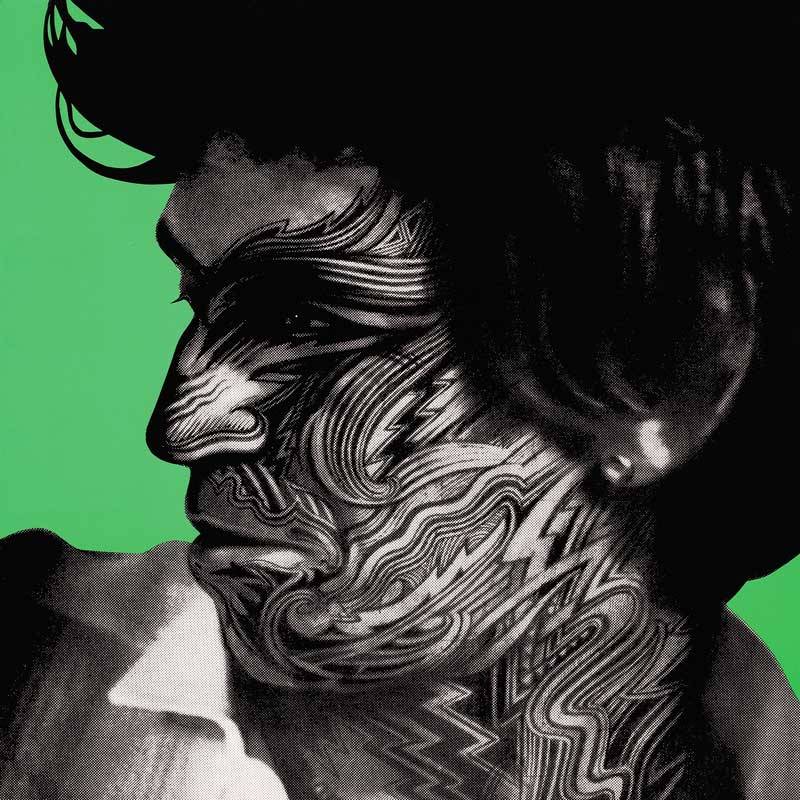
Keith Richards: No Regrets
As Richards enters middle age — and the Stones release ‘Tattoo You’ — the guitarist talks love, fallen rock stars and the band's future
by KURT LODER | November 12, 1981
"I've just been closeted with Napoleon," Keith Richards said, tilting his wine glass in mock salute. "Mick's been sick. Got the flu, I think." It was exactly one week before the start of the Rolling Stones' first U.S. tour in three years, but Richards seemed unfazed by the loss of a much-needed all-night rehearsal. Looking very teenage-wasteland in a black bomber jacket, black T-shirt and black jeans, with blue-suede boots scrunched down around his ankles and a dark green scarf knotted at his waist, he nevertheless appeared healthy and in high spirits.
We were standing in the big country kitchen at Long View Farm, a remote but luxurious recording compound in rural Massachusetts where the Stones had been whipping their act into shape for the past month. It was nine p.m., and the kitchen buffet was groaning with roasted meats, steaming lobsters and crocks full of fresh, buttered vegetables. Over in the dining alcove, Charlie Watts was panning his portable video camera across a large corner table where Bill Wyman and the two auxiliary keyboardists, Ian Stewart and Ian McLagan, sat lingering at their plates. I noticed that the famous heads are going gray now, the faces beginning to sag like trail-weathered saddlebags. "Look at your face, baby," Mick Jagger sings on the Stones' new album. "Look at you and look at me." For a moment, I caught myself looking into that mirror, too.
The upcoming Stones tour would be the most testing of their nineteen-year career. A law unto themselves in the past, they were now old beyond argument, and so found themselves in the position of having to go out once more and prove, in public, that they could still do it. That they still had the creative goods was not in question: Tattoo You, their new LP, showed all of the old power still surging, and the lyrics were informed by a rich new emotional complexity. It was the act that needed spiffing up.
Keith Richards was determined that all would be okay. At thirty-seven, ravaged by all the wild years of drug busts and screaming court headlines, he had begun to perceive an emerging order in his life. His longtime relationship with Anita Pallenberg, the mother of his two children, Marlon and Dandelion, had fallen apart in an ugly, public way, but his ongoing romance with Patti Hansen, a young model, offered hope of renewal. And even in middle age, he found, rock & roll still made a kind of perfect, powerful sense. So, once again, he gathered the Stones around him.
Out in the barn, a gleaming polished-pine stage had been constructed high up across the 100-foot width of the loft. A dozen or so feet below was a small living area that contained a fireplace, an expensive stereo system and a side-board filled with good wines and spirits. Keith strolled in and slipped a cassette into the stereo. He announced it as "the best album of the year." It was the Neville Brothers' Fiyo on the Bayou, an exhilarating feast of rolling, New Orleans-style R&B. Keith poured himself a tumbler of Jack Daniel's, I grabbed a bottle of wine, and we settled at a table to soak, in Aaron Neville's breathtaking rendition of the ancient doo-wop classic "The Ten Commandments of Love." Still suckers after all these years. Can the Stones cut it in 1981? All you had to do, said Keith, was start 'em up.
What's it like rounding up the Rolling Stones after three years and trying to play together again?
Um, surprisingly easy. Getting them over the idea of workin' on the road, that's the hard bit. You know, they're going, "Ohhh, I don't wanna go on the road." And I'm tryin' to hustle them, because I know that it's the only way to keep 'em together. They always feel good about it once they do it; maybe I kind of crystallize that feeling or focus it or whatever, because everybody feels the same way as me, but not at the same time. But if the band wants to stay together, then we do have to go on the road and we do have to work. And once we get up there and start rehearsing, it's great. And it only gets better and better, you know? The problem is — this has been one of my favorite gripes for years — that because of the way we work, doing a blockbuster tour every three years, we find ourselves on this cycle of working our way up to a certain point where we can say, now we're breaking, now we're taking off into somewhere else. And then, because the tour stops — boom — we're never able to get past that point, to push it when it's still getting better. And three years later, we have to start again from scratch', going over the same ground to find out what we already know. That's the one thing that bugs me. I've always wanted to find out what would happen if we just kept going.
Judging by Tattoo You, it seems like the band could keep going, creatively at least, for another twenty years. Hope so, anyway.
So do I, because nobody else has done it, you know? It's kind of interesting to find out how rock & roll can grow up. I mean, there are other examples, obviously, but on the sort of scale the Rolling Stones are on, and have been on for so long, it still seems that if we do our best, they respond to it immediately — the audience, the kids, whatever you want to call it. Some of them are not so young anymore. Nor are we.
The punks were fond of pointing that out during their moment in the spotlight.
That's like punks. They always come and go.
Did you find anything worthwhile in punk rock?
Yeah, there was a certain spirit there. But I don't think there was anything new musically, or even from the PR point of view, image-wise. There was too much image, and none of the bands were given enough chance to put their music together, if they had any. It seemed to be the least important thing. It was more important if you puked over somebody, you know? But that's a legacy from us also. After all, we're still the only rock & roll band arrested for peeing on a wall.
Apparently, the punks weren't impressed. They really seemed to hate bands like the Stones.
That's what we used to say about everything that went before us. But you need a bit more than just putting down people to keep things together. There's always somebody better at puttin' you down. So don't put me down, just do what I did, you know? Do me something better. Turn me on.
When and where did you write the material on Tattoo You?
A lot of it was done in Paris. One of the tracks, "Worried about You," was done for Black and Blue. The rest were done in Paris between 1977 and last year. I mean, we cut over forty tracks for Emotional Rescue, but at that time it was a matter of picking out the tracks that were the nearest to completion, because we had a deadline that didn't allow us much time. On this album, we took longer. We started to think about this one soon after the last one came out, and we chose the songs a lot more carefully.
Will we be seeing more songs from those sessions in the future?
Oh, yeah, there's still loads. I mean, we could get another album out of that bunch. But that's an advantage you don't think about, really, with a band that goes on for a long time. One way or another, you end up with a backlog of really good stuff that, for one reason or another, you didn't get the chance to finish or put out because it was the wrong tempo or too long — purely technical reasons, you know? Sometimes we write our songs in installments — just get the melody and the music, and we'll cut the tracks and write the words later. That way, the actual tracks have matured, just like wine — you just leave it in the cellar for a bit, and it comes out a little better a few years later. It's stupid to leave all that great stuff just for want of finishin' it off and gettin' it together.
Think of all the potential hits that might be lying around.
Yeah, and we probably don't even recognize half of them. I mean, you just don't know after a while. I'm the guy who said "Satisfaction" wasn't a single. That's what I know.
I gather you don't take the music business very seriously.
There's nothing to be taken seriously. No way. If you look at the music business over a long period of time, it's always put out mostly shit.
Is that why people aren't buying as much music as they used to? Is it a combination of shitty music and a bad economy?
Music is a luxury, as far as people are concerned. I'm not sayin' I believe that, but to people who haven't got work, and haven't got money, music will seem a luxury. In actual fact, music is a necessity, because it's the one thing that will maybe bring you up and give you just that little bit extra to keep on going, or. . . . Who knows what music does?
Apparently, you and Mick are still writing about whatever's happening to you at the moment. "Hang Fire," for instance, is explicitly about England, right?
Yeah: " . . . where I come from, nobody ever works, nothing ever gets done." They're going through their little traumas over there. It serves them right for kickin' us out.
What's happening to England?
It's coming to terms with a whole lot of problems that have been brewing for years, and the only thing it needed for these problems to come to a head was for the money to get tight. Everybody tolerates everything while they're doin' all right, Jack; but when they're not, it's "What the @#$%& . . . ?" Now they gotta deal with that.
How do you feel about the situation there politically? Are you at all political?
No. I watch it, you know. It's the height of cynicism for me to watch that whole power play go down. Just to see such hams get away with such a bad act over and over again, you know. I mean, it's an ongoing soap opera of the worst kind, but people still watch it.
Do you care? Do you think there may be some sort of ideal remedy?
No, there's no ideal thing. People are people, and they're pressured into one corner or another. What is politics? Politics goes down in everything. It's always ugly. Politics is an ugly word these days, and the only people who make politics an ugly word are politicians, because they're ugly people. Not necessarily ugly to start with — I'm givin' them the benefit of the doubt — but even if they aren't, they will be after a couple of years in Washington or Moscow or London, in that circle they move in. I always look upon it as, "Yeah, these are the guys who couldn't play Biloxi."
Do you get back to England very often?
Fairly regularly. This year I haven't, but for the past couple of years I've gone back around August for two months or so. After about a week in London, I tend to drift out to the country, where things never change. I go to a little village where there are only about three people who have ever been to London, you know — and it's only seventy miles away. "Oh, London? No, never been there. Too many people." It's kind of timeless there. It's a real great anchor for me. It still sticks in my throat a little that I can't, you know . . . what do you mean I make too much money to live here? You mean I can't afford to live in England? It's just kind of vindictive. I mean, I can't consider us part of the brain drain or anything like that, but they certainly flushed us down their john, you know? "In the bathroom of your heart, I've been flushed, dear. . . . "
"Neighbours" seems to be another slice of life — yours, I gather. Weren't you and Patti evicted from your Manhattan apartment earlier this year for playing music too loud?
Oh, a couple of them. Yeah, Patti and I are homeless at the moment. Mick wrote the lyrics to that — and he never has trouble with neighbors.
Just a quiet guy, right?
No, he's not. He's just smart. He got himself into a good old building with very thick walls and nobody particular around. I have a knack of finding a whole building of very cool people, you know, but there'll be one uncool couple — they're always a couple. And my apartment will always be either just above them or next door to them or just below. And they're the kind of people who'll knock you up at six in the morning, while you've just sort of got a little bit of music going. You're trying to be cool, 'cause you're aware of it, you know? By now, I'm aware that I can't blast the sounds. So I'm trying to be cool about it. And these people come up to our door saying, "We can't even hear Bugs Bunny on our TV, your music's so loud! Turn the kettledrums down!" So, I mean, I'm plagued by that kind of thing. I swear they're the same couple everywhere I go. They just follow me around: "Let's bug him; he's an @#$%&, he deserves it."
"Neighbours" is the first song I think Mick's ever really written for me. It's one I wish I'd written, that.
You and Mick appear to have one of the great friendships of our era. Is it really as solid as it seems?
Yeah. It's a true friendship when you can bash somebody over the head and not be told, "You're not my friend anymore." That's a true friendship. You put up with each other's bitching. People will think we're having these huge arguments and say, "Oh, will they split up?" But it's our way of working, you know? He's my wife. And he'll say the same thing about me: "Yeah, he's my wife."
I think the popular perception is that Mick is probably the better businessman of the two. Have you handled your money well?
I make it and I spend it, but it's set up in a way. Mick is pretty good at business. He's not as good as people think. He's probably not as good as he thinks. And he's probably not as bad as I think. Mick wants to know about every angle of everything, you know? Which is admirable — I certainly don't have the time or the inclination to find out those things. But we pool our information.
Do you ever feel you've become too rich to relate to your audience?
I just feel there's an audience out there,and as long as they want to hear it, I guess we'll go on making it.
How do rich people have the blues?
I don't know. I've never met a rich person yet who's felt rich. Because from my own experience, the bigger things get and the more money you make, the more it takes to run the whole show. Especially tax attorneys. And therefore, the more you have to go out and make more money to pay them to give you . . . it's a diminishing return, you know? I've never felt rich. I've never really thought about it. All I'm worried about is having enough to keep the show on the road, you know. As long as that's there, then it's all right. The rest of it — what am I gonna do with it anyway? I spend half my life in the studio, and when I'm not there, I'm hustling to get on the road again. So, I mean, I can spend it, but I don't know where it goes.
Do the Rolling Stones ever socialize with each other anymore?
Yeah, we're always in touch. Charlie bounces into New York or wherever once every couple of months. As far as I'm concerned, I'd just say that I'm continually thankful — and more so as we go along — that we have Charlie Watts sittin' there, you know? He's the guy who doesn't believe it, because he's like that. I mean, he doesn't think that his contribution is as —
Really?
Yeah. There's nothing forced about Charlie, least of all his modesty. It's totally real. He cannot understand what people see in his drumming.
That's amazing.
I think so.
What about Ron Wood? He's been part of the act for about six years now, but I think some people still tend to dismiss him as a kind of Keith Richards clone.
I was the one who was most apprehensive about taking Ronnie into this. He's a very good friend of mine, and I've worked on his solo albums. But he doesn't play like me. To me, Ronnie's keeping together that idea of the Stones sound that Brian and I had. That's how I feel about Ronnie. He has an instinctive feel for what Brian and I originally worked out as far as guitars and the music go. Siamese twins — they both play. Look at it like this: there's one guy, he's just got four arms. That's the way I like to feel about it. Because when it comes out, it doesn't matter how many people are playing and who's doing what. When that sound comes out, does it hit you between the eyes and does it grab you?
Brian's been dead for twelve years now. Do you still think about him?
Yeah, I think about him every time we play "Time Is on My Side," or when I'm playing his guitar licks on "Mona." Brian, in many ways, was a right @#$%&. He was a bastard. Mean, generous, anything. You want to say one thing, give it the opposite, too. But more so than most people, you know. Up to a point, you could put up with it. When you were put under the pressures of the road, either you took it seriously or you took it as a joke. Which meant that eventually — it was a very slow process, and it shifted and changed, and it is so impossible to describe — but in the last year or so, when Brian was almost totally incapacitated all of the time, he became a joke to the band. It was the only way we could deal with it without gettin' mad at him. So then it became that very cruel, piss-taking thing behind his back all the time. It all came to a head when ... he was with Anita at the time, and he started beating her up and kickin' her around. And I said, "Come on, darlin', you don't need this. Let's go. I'll just take you away." I didn't give a shit. I wasn't involved in it at the time. Just, "Let's go. I'll take you out of this, at least, then you can do what you want." So we split. It was very romantic — Marrakesh, tramping through the desert and all that crap. I mean, Brian was so ludicrous in some ways and such a nice guy in some ways. It was like they used to say about Stan Getz: "He's a nice buncha guys." You just never knew which one you were gonna meet.
The Brian-Anita-Keith triangle is a centerpiece of Up and Down with the Rolling Stones, by Tony Sanchez, which came out in 1979. Sanchez described himself as, among other things, your drug procurer, and his description of your lifestyle in those years — late Sixties, early Seventies — is one of almost total dissipation and addiction. Is any or all of this true?
Spanish Tony's book? Let's put it like this: I couldn't plow through it all because my eyes were watering from laughter. But the basic laying out of the story — "He did this, he did that" — is true. Tony didn't really write it. He had some hack from Fleet Street write it; obviously, Tony can hardly write his own name, you know? He was a great guy. I always considered him a friend of mine. I mean, not anymore. But I understand his position: he got into dope, his girlfriend ODed, he went on the skids and . . . it's all this shit, you know? As far as that book's concerned, as far as, like, a particular episode, just the bare facts — yeah, they all happened. But by the time you got to the end, it was like Grimm's Fairy Tales — with emphasis on the grim. It's really all old stuff. You know, there are certain showbiz cliches that always seem to hold true. One is that there's no such thing as bad publicity, and the other is that the show must go on, right?
Have you seen Sanchez since the book came out?
Yeah, a couple of years ago.
Did you punch his lights out, or what?
No. I showed him a new shooter I'd gotten. I haven't seen him since.
What's become of Anita? Is she all right?
Yeah, she's fine, man. She's fine. I don't consider myself separated from Anita or anything. She's still the mother of my kids. Anita is a great, great woman. She's a fantastic person. I love her. I can't live with her, you know? I don't know if I really see that much less of Anita now than I ever have. She's in New York.
Doesn't it drive you nuts to live your personal life out in public?
Usually it's not from within — not from Anita or Patti or myself. It's other people saying, "Oh, we should play this down." Which I'm not interested in doin', because the only way I've ever been able to survive any of this crap is by saying: "Anything you put on your front page, I can top it." Because I'll give you the real lowdown, which is far more interesting. The last thing I want is to seem that I'm hiding anything, or playing a role. Sure, you don't want to call up the Daily News and say, "Well, last night I screwed . . . " but at the same time, I don't want anybody to think it's worth snooping around in my backyard thinking they're gonna pick up anything that they wouldn't learn by asking me.
As far as my relationships go, with Anita or anybody — I don't understand the meaning of separation. It's a legal phrase, that. And since I've never done anything legally, or never considered whether it's legal or not . . . I mean, I do what I do. The only areas of illegality that I've been involved in are ones that are questionable. Like, the question of victimless crimes. You can say that being a junkie is not really being a criminal, because it's just a law. But then again, junkies are the ones who buy the stuff from the dealers, the dealers make the money off the junkies, and dealers are the ones who go and corrupt the other kids, da, da, da. So where does the responsibility begin and end? I don't know. I don't really care, because it's a fact of life. I mean, all those questions are talked about by people who know nothing about it, as you well know. They're the ones who decide to put every patient they get on Methadone — to force them into the belief that if you've taken dope at all, you'd better get on Methadone right away, because you're always gonna need it. But they don't mention that for every patient those clinics get, they get bread from the feds.
You've tried Methadone?
Only when I couldn't get nothin' else. What a dopey drug, you know — dopey in the sense of nondope. What a dopey nondope.
Did heroin affect your music, for better or worse?
Thinking about it, I would probably say yeah, I'd probably have been better, played better, off of it I mean, sometimes people think they play better on dope, but it's . . . in actual fact, when I was onstage playing, or recording, and I was doped up, you know, and I listen to it now — I mean, sometimes I still have to play what I played then. "Right, I've gotta play this goddamn junkie music? Me? Now? I've been through it." And I still gotta play my junk licks. But I can't imagine what else I would have played, no matter whether I was drunk, on dope or on Preparation H — they sniff it, you know.
The thing about smack is that you don't have any say in it. It's not your decision anymore. You need the dope, that's the only thing. "Why? I like it." It takes the decision off your shoulders. You'll go through all those incredible hassles to get it, and think nothing of it. Because that is the number-one priority: first the dope, then you can get home and do anything else that needs doing, like living. If you can.
Did you realize that you were addicted?
Oh, totally, yeah. I accepted that. It took me about two years to get addicted. The first two years, I played around with it. It's the greatest seduction in the world. The usual thing, snort it up. Then: "What do you mean I'm hooked? I've taken it for two days and I feel all right. I haven't had any for . . . all day." And then you think that's cool. And it draws you in, you know.
How do you get off junk?
You just have to want to reach that point. I mean, I kicked it loads of times. The problem is not how to get off of it, it's how to stay off of it. Yep, that's the one.
Do you still feel drawn toward it?
I always, um . . . never say never. But no, no.
Obviously, some of the Stones' greatest music was made on dope.
Yeah, Exile on Main St. was heavily into it. So was Sticky Fingers. . . .
Was it difficult for you to record those albums?
No, I mean, especially with the Stones, just because they've been at this sort of point for so long, where they're considered, you know, "the greatest rock & roll band in the world...." [Laughs] God, my God — you gotta be joking. Maybe one or two nights, yeah, you could stick them with that. My opinion is that on any given night, it's a different band that's the greatest rock & roll band in the world, you know? Because consistency is fatal for a rock & roll band. It's gotta go up and down. Otherwise, you wouldn't know the difference. It would be just a bland, straight line, like lookin' at a heart machine. And when that straight line happens, baby, you're dead, you know?
Rock has an awfully high death rate, it seems. Among your contemporaries, John Lennon, Keith Moon, John Bonham — when you see them go, does it worry you?
There are risks in doing anything. In this business, people tend to think it'll never happen to them. But what a way to make a living, you know? Looking at the record over the last twenty-odd years, it goes without saying, I should think, that there is a very high fatality rate in the rock & roll music business. Look at the list, man, look at who's been scythed down: Hank Williams, Buddy Holly, Elvis, Gene Vincent, Eddie Cochran. The list is endless. And the greats, a lot of the greats have gone down. Otis, man. I mean, that one killed soul music.
I've always felt that Jimi Hendrix was the greatest loss. Did you know him?
Fairly well. By the period of his demise — to put it politely — he was at the point of totally putting down and negating everything that had made him what he was. I mean all the psychedelic stuff. He felt like he'd been forced to do it over and over again so many times, just because that's what he was known for. When I first heard him, he was playing straight-ahead R&B.
When was that?
I first heard him on the road with Curtis Knight, and then I used to see him play at a club called Ondine's in New York.
What did you think when you first heard him?
I thought I was watching someone just about to break. But as far as his being a guitar player, I mean, I was disappointed when the records started comin' out. Although, given the time and that period, and given the fact that he was forced into an "English psychedelic bag" and then had to live with it because that's what made him . . . one of the reasons that he was so down at the period when he died was because he couldn't find a way out of that. He wanted to just go back and start playing some funky music, and when he did, nobody wanted to know.
It was a weird period.
Yeah. Everybody got sort of carried on this tidal wave of success for doing outlandish things, until what they were really known for was the outlandishness of what they were doing, and not really what they were doing. I mean, even with Satanic Majesties, I was never hot on psychedelic music.
Everybody's always put Their Satanic Majesties Request down, but I've been listening to a clean copy of it recently and there's some good stuff on there, despite the ridiculous mix.
The only thing I can say, from the Stones' point of view, is that it was the first album we ever made off the road. Because we stopped touring; we just burned up by 1966. We finished Between the Buttons, you know, "Let's Spend the Night Together," and boom, we stopped working for like a year and a half. And in that year and a half, we had to make another album. And that was insane — on acid, busted, right? It was like such a fractured business, a total alien way of working to us at the time. So it kind of reflects. It's a fractured album. There are some good bits, and it's weird, and there's some real crap on it as well.
Has having kids changed you at all? Your son, Marlon, is almost a teenager now, right?
Just about, yeah. He's beatin' the shit out of me. It's gotten to the point now, in the last few months, where I've noticed he's coming up and reprimanding me, you know? "Dad! Get up! There's a rehearsal. They're waitin'!" And I'm takin' it — I'm takin it! "Yeah, okay, I'm ready. Give me my jeans." And he says, "Oh, yeah — you look like you're ready. You got one eye closed!" I don't really have to worry about Marlon, he's so together. I mean, he's been on the road since he was about a year old, so to him this is all totally normal. He used to crash out to "Midnight Rambler" every night behind my amp, you know?
It's nice not to have to be a disciplinarian.
Yeah. Or only if something's really grating on my hangover. But I've been lucky. I've never been forced into that position of saying, "Now look here, son, you can't do that." I'm still half waiting for my own old man to start knocking me about — "Bloody rock & roll! You fool!" Bash!
Your dad's still alive?
Yeah. I have not seen him. Occasionally, I write him a letter: "I really want to get together with you again," you know? And I get a really nice letter back. He's a great guy, but very hard to get to know. He was born in 1914, and I didn't have anything to say to him when I was eighteen. It was a total stand-off, you know? And so I left home and got the band together with Mick and Brian.
Has your father ever seen Marlon?
No, no. I know what I should do, man, I know. I'm workin' on it now. In fact, I'm glad you asked me that. You reminded me, 'cause I sent him a letter about a month ago, saying, "If you wanna come over. . . . " Either that or send him a ticket and say the plane's leaving, get your passport and get your ass over here. He's only been out of England once, and that was to France to get his leg blown up. The Anglo-American tour of Normandy, they called it.
Judging by some of the songs on Tattoo You, your and Mick's attitudes toward women seem to have changed somewhat. With the exception of "Little T&A," that is. . . .
Well, that song's just about every good time I've had with somebody I'd met for a night or two and never seen again. And also about the shit that sometimes goes down when you just sort of bump into people unknowingly, and not knowing the scene you're walking in on, you know? You pick up a chick and end up spending the night in the tank, you know?
On the other hand, "Black Limousine," for instance, seems more generous in its appraisal of a past relationship. Quite vulnerable, really.
Yeah, because time marches on, et cetera. And also, I guess, because the women in our lives at the moment have made a change in our attitudes toward it. I guess because everything that comes out from the Stones is just as it comes out. I mean, you just turn on the tap and it pours out. That's how we used to feel about it, and that's how we feel about it now. This is purely a guess, because I haven't really thought about it, but it seems logical that the people you're with are the ones who are gonna influence you most, whether you intend it or not. Mick might intend to sit down and write a real Stones song — you know: "Blechhh! You cruddy piece of shit, you dirty old scrub box!" But obviously, that's not the way he's feeling now. It's not the way I'm feeling now.
Would it be fair to say that you're both in love?
Oh, yeah. But I've always been in love.
It seems like you and Patti, though. . . .
It's a big one, it's a big one. Yeah. It doesn't matter, I'll tell ya — yeah, I'm in love. Those are the things that, when you're at the other end of the scale, you know, and you think, "Oh, goddamn, you can only be in love when you're eighteen or twenty-three or . . . But then you get older and suddenly — bang! One again! And you realize that was all a load of crap. And those are the things that turn you on, you know? Those are the things that make you look forward, keep you going. You say, well, if it can happen, keep on going. I mean, it's the greatest feeling in the world, right?
Love is good!
Love wears a white Stetson.
This story is from the November 12, 1981 issue of Rolling Stone.

Keith Richards: No Regrets
As Richards enters middle age — and the Stones release ‘Tattoo You’ — the guitarist talks love, fallen rock stars and the band's future
by KURT LODER | November 12, 1981
"I've just been closeted with Napoleon," Keith Richards said, tilting his wine glass in mock salute. "Mick's been sick. Got the flu, I think." It was exactly one week before the start of the Rolling Stones' first U.S. tour in three years, but Richards seemed unfazed by the loss of a much-needed all-night rehearsal. Looking very teenage-wasteland in a black bomber jacket, black T-shirt and black jeans, with blue-suede boots scrunched down around his ankles and a dark green scarf knotted at his waist, he nevertheless appeared healthy and in high spirits.
We were standing in the big country kitchen at Long View Farm, a remote but luxurious recording compound in rural Massachusetts where the Stones had been whipping their act into shape for the past month. It was nine p.m., and the kitchen buffet was groaning with roasted meats, steaming lobsters and crocks full of fresh, buttered vegetables. Over in the dining alcove, Charlie Watts was panning his portable video camera across a large corner table where Bill Wyman and the two auxiliary keyboardists, Ian Stewart and Ian McLagan, sat lingering at their plates. I noticed that the famous heads are going gray now, the faces beginning to sag like trail-weathered saddlebags. "Look at your face, baby," Mick Jagger sings on the Stones' new album. "Look at you and look at me." For a moment, I caught myself looking into that mirror, too.
The upcoming Stones tour would be the most testing of their nineteen-year career. A law unto themselves in the past, they were now old beyond argument, and so found themselves in the position of having to go out once more and prove, in public, that they could still do it. That they still had the creative goods was not in question: Tattoo You, their new LP, showed all of the old power still surging, and the lyrics were informed by a rich new emotional complexity. It was the act that needed spiffing up.
Keith Richards was determined that all would be okay. At thirty-seven, ravaged by all the wild years of drug busts and screaming court headlines, he had begun to perceive an emerging order in his life. His longtime relationship with Anita Pallenberg, the mother of his two children, Marlon and Dandelion, had fallen apart in an ugly, public way, but his ongoing romance with Patti Hansen, a young model, offered hope of renewal. And even in middle age, he found, rock & roll still made a kind of perfect, powerful sense. So, once again, he gathered the Stones around him.
Out in the barn, a gleaming polished-pine stage had been constructed high up across the 100-foot width of the loft. A dozen or so feet below was a small living area that contained a fireplace, an expensive stereo system and a side-board filled with good wines and spirits. Keith strolled in and slipped a cassette into the stereo. He announced it as "the best album of the year." It was the Neville Brothers' Fiyo on the Bayou, an exhilarating feast of rolling, New Orleans-style R&B. Keith poured himself a tumbler of Jack Daniel's, I grabbed a bottle of wine, and we settled at a table to soak, in Aaron Neville's breathtaking rendition of the ancient doo-wop classic "The Ten Commandments of Love." Still suckers after all these years. Can the Stones cut it in 1981? All you had to do, said Keith, was start 'em up.
What's it like rounding up the Rolling Stones after three years and trying to play together again?
Um, surprisingly easy. Getting them over the idea of workin' on the road, that's the hard bit. You know, they're going, "Ohhh, I don't wanna go on the road." And I'm tryin' to hustle them, because I know that it's the only way to keep 'em together. They always feel good about it once they do it; maybe I kind of crystallize that feeling or focus it or whatever, because everybody feels the same way as me, but not at the same time. But if the band wants to stay together, then we do have to go on the road and we do have to work. And once we get up there and start rehearsing, it's great. And it only gets better and better, you know? The problem is — this has been one of my favorite gripes for years — that because of the way we work, doing a blockbuster tour every three years, we find ourselves on this cycle of working our way up to a certain point where we can say, now we're breaking, now we're taking off into somewhere else. And then, because the tour stops — boom — we're never able to get past that point, to push it when it's still getting better. And three years later, we have to start again from scratch', going over the same ground to find out what we already know. That's the one thing that bugs me. I've always wanted to find out what would happen if we just kept going.
Judging by Tattoo You, it seems like the band could keep going, creatively at least, for another twenty years. Hope so, anyway.
So do I, because nobody else has done it, you know? It's kind of interesting to find out how rock & roll can grow up. I mean, there are other examples, obviously, but on the sort of scale the Rolling Stones are on, and have been on for so long, it still seems that if we do our best, they respond to it immediately — the audience, the kids, whatever you want to call it. Some of them are not so young anymore. Nor are we.
The punks were fond of pointing that out during their moment in the spotlight.
That's like punks. They always come and go.
Did you find anything worthwhile in punk rock?
Yeah, there was a certain spirit there. But I don't think there was anything new musically, or even from the PR point of view, image-wise. There was too much image, and none of the bands were given enough chance to put their music together, if they had any. It seemed to be the least important thing. It was more important if you puked over somebody, you know? But that's a legacy from us also. After all, we're still the only rock & roll band arrested for peeing on a wall.
Apparently, the punks weren't impressed. They really seemed to hate bands like the Stones.
That's what we used to say about everything that went before us. But you need a bit more than just putting down people to keep things together. There's always somebody better at puttin' you down. So don't put me down, just do what I did, you know? Do me something better. Turn me on.
When and where did you write the material on Tattoo You?
A lot of it was done in Paris. One of the tracks, "Worried about You," was done for Black and Blue. The rest were done in Paris between 1977 and last year. I mean, we cut over forty tracks for Emotional Rescue, but at that time it was a matter of picking out the tracks that were the nearest to completion, because we had a deadline that didn't allow us much time. On this album, we took longer. We started to think about this one soon after the last one came out, and we chose the songs a lot more carefully.
Will we be seeing more songs from those sessions in the future?
Oh, yeah, there's still loads. I mean, we could get another album out of that bunch. But that's an advantage you don't think about, really, with a band that goes on for a long time. One way or another, you end up with a backlog of really good stuff that, for one reason or another, you didn't get the chance to finish or put out because it was the wrong tempo or too long — purely technical reasons, you know? Sometimes we write our songs in installments — just get the melody and the music, and we'll cut the tracks and write the words later. That way, the actual tracks have matured, just like wine — you just leave it in the cellar for a bit, and it comes out a little better a few years later. It's stupid to leave all that great stuff just for want of finishin' it off and gettin' it together.
Think of all the potential hits that might be lying around.
Yeah, and we probably don't even recognize half of them. I mean, you just don't know after a while. I'm the guy who said "Satisfaction" wasn't a single. That's what I know.
I gather you don't take the music business very seriously.
There's nothing to be taken seriously. No way. If you look at the music business over a long period of time, it's always put out mostly shit.
Is that why people aren't buying as much music as they used to? Is it a combination of shitty music and a bad economy?
Music is a luxury, as far as people are concerned. I'm not sayin' I believe that, but to people who haven't got work, and haven't got money, music will seem a luxury. In actual fact, music is a necessity, because it's the one thing that will maybe bring you up and give you just that little bit extra to keep on going, or. . . . Who knows what music does?
Apparently, you and Mick are still writing about whatever's happening to you at the moment. "Hang Fire," for instance, is explicitly about England, right?
Yeah: " . . . where I come from, nobody ever works, nothing ever gets done." They're going through their little traumas over there. It serves them right for kickin' us out.
What's happening to England?
It's coming to terms with a whole lot of problems that have been brewing for years, and the only thing it needed for these problems to come to a head was for the money to get tight. Everybody tolerates everything while they're doin' all right, Jack; but when they're not, it's "What the @#$%& . . . ?" Now they gotta deal with that.
How do you feel about the situation there politically? Are you at all political?
No. I watch it, you know. It's the height of cynicism for me to watch that whole power play go down. Just to see such hams get away with such a bad act over and over again, you know. I mean, it's an ongoing soap opera of the worst kind, but people still watch it.
Do you care? Do you think there may be some sort of ideal remedy?
No, there's no ideal thing. People are people, and they're pressured into one corner or another. What is politics? Politics goes down in everything. It's always ugly. Politics is an ugly word these days, and the only people who make politics an ugly word are politicians, because they're ugly people. Not necessarily ugly to start with — I'm givin' them the benefit of the doubt — but even if they aren't, they will be after a couple of years in Washington or Moscow or London, in that circle they move in. I always look upon it as, "Yeah, these are the guys who couldn't play Biloxi."
Do you get back to England very often?
Fairly regularly. This year I haven't, but for the past couple of years I've gone back around August for two months or so. After about a week in London, I tend to drift out to the country, where things never change. I go to a little village where there are only about three people who have ever been to London, you know — and it's only seventy miles away. "Oh, London? No, never been there. Too many people." It's kind of timeless there. It's a real great anchor for me. It still sticks in my throat a little that I can't, you know . . . what do you mean I make too much money to live here? You mean I can't afford to live in England? It's just kind of vindictive. I mean, I can't consider us part of the brain drain or anything like that, but they certainly flushed us down their john, you know? "In the bathroom of your heart, I've been flushed, dear. . . . "
"Neighbours" seems to be another slice of life — yours, I gather. Weren't you and Patti evicted from your Manhattan apartment earlier this year for playing music too loud?
Oh, a couple of them. Yeah, Patti and I are homeless at the moment. Mick wrote the lyrics to that — and he never has trouble with neighbors.
Just a quiet guy, right?
No, he's not. He's just smart. He got himself into a good old building with very thick walls and nobody particular around. I have a knack of finding a whole building of very cool people, you know, but there'll be one uncool couple — they're always a couple. And my apartment will always be either just above them or next door to them or just below. And they're the kind of people who'll knock you up at six in the morning, while you've just sort of got a little bit of music going. You're trying to be cool, 'cause you're aware of it, you know? By now, I'm aware that I can't blast the sounds. So I'm trying to be cool about it. And these people come up to our door saying, "We can't even hear Bugs Bunny on our TV, your music's so loud! Turn the kettledrums down!" So, I mean, I'm plagued by that kind of thing. I swear they're the same couple everywhere I go. They just follow me around: "Let's bug him; he's an @#$%&, he deserves it."
"Neighbours" is the first song I think Mick's ever really written for me. It's one I wish I'd written, that.
You and Mick appear to have one of the great friendships of our era. Is it really as solid as it seems?
Yeah. It's a true friendship when you can bash somebody over the head and not be told, "You're not my friend anymore." That's a true friendship. You put up with each other's bitching. People will think we're having these huge arguments and say, "Oh, will they split up?" But it's our way of working, you know? He's my wife. And he'll say the same thing about me: "Yeah, he's my wife."
I think the popular perception is that Mick is probably the better businessman of the two. Have you handled your money well?
I make it and I spend it, but it's set up in a way. Mick is pretty good at business. He's not as good as people think. He's probably not as good as he thinks. And he's probably not as bad as I think. Mick wants to know about every angle of everything, you know? Which is admirable — I certainly don't have the time or the inclination to find out those things. But we pool our information.
Do you ever feel you've become too rich to relate to your audience?
I just feel there's an audience out there,and as long as they want to hear it, I guess we'll go on making it.
How do rich people have the blues?
I don't know. I've never met a rich person yet who's felt rich. Because from my own experience, the bigger things get and the more money you make, the more it takes to run the whole show. Especially tax attorneys. And therefore, the more you have to go out and make more money to pay them to give you . . . it's a diminishing return, you know? I've never felt rich. I've never really thought about it. All I'm worried about is having enough to keep the show on the road, you know. As long as that's there, then it's all right. The rest of it — what am I gonna do with it anyway? I spend half my life in the studio, and when I'm not there, I'm hustling to get on the road again. So, I mean, I can spend it, but I don't know where it goes.
Do the Rolling Stones ever socialize with each other anymore?
Yeah, we're always in touch. Charlie bounces into New York or wherever once every couple of months. As far as I'm concerned, I'd just say that I'm continually thankful — and more so as we go along — that we have Charlie Watts sittin' there, you know? He's the guy who doesn't believe it, because he's like that. I mean, he doesn't think that his contribution is as —
Really?
Yeah. There's nothing forced about Charlie, least of all his modesty. It's totally real. He cannot understand what people see in his drumming.
That's amazing.
I think so.
What about Ron Wood? He's been part of the act for about six years now, but I think some people still tend to dismiss him as a kind of Keith Richards clone.
I was the one who was most apprehensive about taking Ronnie into this. He's a very good friend of mine, and I've worked on his solo albums. But he doesn't play like me. To me, Ronnie's keeping together that idea of the Stones sound that Brian and I had. That's how I feel about Ronnie. He has an instinctive feel for what Brian and I originally worked out as far as guitars and the music go. Siamese twins — they both play. Look at it like this: there's one guy, he's just got four arms. That's the way I like to feel about it. Because when it comes out, it doesn't matter how many people are playing and who's doing what. When that sound comes out, does it hit you between the eyes and does it grab you?
Brian's been dead for twelve years now. Do you still think about him?
Yeah, I think about him every time we play "Time Is on My Side," or when I'm playing his guitar licks on "Mona." Brian, in many ways, was a right @#$%&. He was a bastard. Mean, generous, anything. You want to say one thing, give it the opposite, too. But more so than most people, you know. Up to a point, you could put up with it. When you were put under the pressures of the road, either you took it seriously or you took it as a joke. Which meant that eventually — it was a very slow process, and it shifted and changed, and it is so impossible to describe — but in the last year or so, when Brian was almost totally incapacitated all of the time, he became a joke to the band. It was the only way we could deal with it without gettin' mad at him. So then it became that very cruel, piss-taking thing behind his back all the time. It all came to a head when ... he was with Anita at the time, and he started beating her up and kickin' her around. And I said, "Come on, darlin', you don't need this. Let's go. I'll just take you away." I didn't give a shit. I wasn't involved in it at the time. Just, "Let's go. I'll take you out of this, at least, then you can do what you want." So we split. It was very romantic — Marrakesh, tramping through the desert and all that crap. I mean, Brian was so ludicrous in some ways and such a nice guy in some ways. It was like they used to say about Stan Getz: "He's a nice buncha guys." You just never knew which one you were gonna meet.
The Brian-Anita-Keith triangle is a centerpiece of Up and Down with the Rolling Stones, by Tony Sanchez, which came out in 1979. Sanchez described himself as, among other things, your drug procurer, and his description of your lifestyle in those years — late Sixties, early Seventies — is one of almost total dissipation and addiction. Is any or all of this true?
Spanish Tony's book? Let's put it like this: I couldn't plow through it all because my eyes were watering from laughter. But the basic laying out of the story — "He did this, he did that" — is true. Tony didn't really write it. He had some hack from Fleet Street write it; obviously, Tony can hardly write his own name, you know? He was a great guy. I always considered him a friend of mine. I mean, not anymore. But I understand his position: he got into dope, his girlfriend ODed, he went on the skids and . . . it's all this shit, you know? As far as that book's concerned, as far as, like, a particular episode, just the bare facts — yeah, they all happened. But by the time you got to the end, it was like Grimm's Fairy Tales — with emphasis on the grim. It's really all old stuff. You know, there are certain showbiz cliches that always seem to hold true. One is that there's no such thing as bad publicity, and the other is that the show must go on, right?
Have you seen Sanchez since the book came out?
Yeah, a couple of years ago.
Did you punch his lights out, or what?
No. I showed him a new shooter I'd gotten. I haven't seen him since.
What's become of Anita? Is she all right?
Yeah, she's fine, man. She's fine. I don't consider myself separated from Anita or anything. She's still the mother of my kids. Anita is a great, great woman. She's a fantastic person. I love her. I can't live with her, you know? I don't know if I really see that much less of Anita now than I ever have. She's in New York.
Doesn't it drive you nuts to live your personal life out in public?
Usually it's not from within — not from Anita or Patti or myself. It's other people saying, "Oh, we should play this down." Which I'm not interested in doin', because the only way I've ever been able to survive any of this crap is by saying: "Anything you put on your front page, I can top it." Because I'll give you the real lowdown, which is far more interesting. The last thing I want is to seem that I'm hiding anything, or playing a role. Sure, you don't want to call up the Daily News and say, "Well, last night I screwed . . . " but at the same time, I don't want anybody to think it's worth snooping around in my backyard thinking they're gonna pick up anything that they wouldn't learn by asking me.
As far as my relationships go, with Anita or anybody — I don't understand the meaning of separation. It's a legal phrase, that. And since I've never done anything legally, or never considered whether it's legal or not . . . I mean, I do what I do. The only areas of illegality that I've been involved in are ones that are questionable. Like, the question of victimless crimes. You can say that being a junkie is not really being a criminal, because it's just a law. But then again, junkies are the ones who buy the stuff from the dealers, the dealers make the money off the junkies, and dealers are the ones who go and corrupt the other kids, da, da, da. So where does the responsibility begin and end? I don't know. I don't really care, because it's a fact of life. I mean, all those questions are talked about by people who know nothing about it, as you well know. They're the ones who decide to put every patient they get on Methadone — to force them into the belief that if you've taken dope at all, you'd better get on Methadone right away, because you're always gonna need it. But they don't mention that for every patient those clinics get, they get bread from the feds.
You've tried Methadone?
Only when I couldn't get nothin' else. What a dopey drug, you know — dopey in the sense of nondope. What a dopey nondope.
Did heroin affect your music, for better or worse?
Thinking about it, I would probably say yeah, I'd probably have been better, played better, off of it I mean, sometimes people think they play better on dope, but it's . . . in actual fact, when I was onstage playing, or recording, and I was doped up, you know, and I listen to it now — I mean, sometimes I still have to play what I played then. "Right, I've gotta play this goddamn junkie music? Me? Now? I've been through it." And I still gotta play my junk licks. But I can't imagine what else I would have played, no matter whether I was drunk, on dope or on Preparation H — they sniff it, you know.
The thing about smack is that you don't have any say in it. It's not your decision anymore. You need the dope, that's the only thing. "Why? I like it." It takes the decision off your shoulders. You'll go through all those incredible hassles to get it, and think nothing of it. Because that is the number-one priority: first the dope, then you can get home and do anything else that needs doing, like living. If you can.
Did you realize that you were addicted?
Oh, totally, yeah. I accepted that. It took me about two years to get addicted. The first two years, I played around with it. It's the greatest seduction in the world. The usual thing, snort it up. Then: "What do you mean I'm hooked? I've taken it for two days and I feel all right. I haven't had any for . . . all day." And then you think that's cool. And it draws you in, you know.
How do you get off junk?
You just have to want to reach that point. I mean, I kicked it loads of times. The problem is not how to get off of it, it's how to stay off of it. Yep, that's the one.
Do you still feel drawn toward it?
I always, um . . . never say never. But no, no.
Obviously, some of the Stones' greatest music was made on dope.
Yeah, Exile on Main St. was heavily into it. So was Sticky Fingers. . . .
Was it difficult for you to record those albums?
No, I mean, especially with the Stones, just because they've been at this sort of point for so long, where they're considered, you know, "the greatest rock & roll band in the world...." [Laughs] God, my God — you gotta be joking. Maybe one or two nights, yeah, you could stick them with that. My opinion is that on any given night, it's a different band that's the greatest rock & roll band in the world, you know? Because consistency is fatal for a rock & roll band. It's gotta go up and down. Otherwise, you wouldn't know the difference. It would be just a bland, straight line, like lookin' at a heart machine. And when that straight line happens, baby, you're dead, you know?
Rock has an awfully high death rate, it seems. Among your contemporaries, John Lennon, Keith Moon, John Bonham — when you see them go, does it worry you?
There are risks in doing anything. In this business, people tend to think it'll never happen to them. But what a way to make a living, you know? Looking at the record over the last twenty-odd years, it goes without saying, I should think, that there is a very high fatality rate in the rock & roll music business. Look at the list, man, look at who's been scythed down: Hank Williams, Buddy Holly, Elvis, Gene Vincent, Eddie Cochran. The list is endless. And the greats, a lot of the greats have gone down. Otis, man. I mean, that one killed soul music.
I've always felt that Jimi Hendrix was the greatest loss. Did you know him?
Fairly well. By the period of his demise — to put it politely — he was at the point of totally putting down and negating everything that had made him what he was. I mean all the psychedelic stuff. He felt like he'd been forced to do it over and over again so many times, just because that's what he was known for. When I first heard him, he was playing straight-ahead R&B.
When was that?
I first heard him on the road with Curtis Knight, and then I used to see him play at a club called Ondine's in New York.
What did you think when you first heard him?
I thought I was watching someone just about to break. But as far as his being a guitar player, I mean, I was disappointed when the records started comin' out. Although, given the time and that period, and given the fact that he was forced into an "English psychedelic bag" and then had to live with it because that's what made him . . . one of the reasons that he was so down at the period when he died was because he couldn't find a way out of that. He wanted to just go back and start playing some funky music, and when he did, nobody wanted to know.
It was a weird period.
Yeah. Everybody got sort of carried on this tidal wave of success for doing outlandish things, until what they were really known for was the outlandishness of what they were doing, and not really what they were doing. I mean, even with Satanic Majesties, I was never hot on psychedelic music.
Everybody's always put Their Satanic Majesties Request down, but I've been listening to a clean copy of it recently and there's some good stuff on there, despite the ridiculous mix.
The only thing I can say, from the Stones' point of view, is that it was the first album we ever made off the road. Because we stopped touring; we just burned up by 1966. We finished Between the Buttons, you know, "Let's Spend the Night Together," and boom, we stopped working for like a year and a half. And in that year and a half, we had to make another album. And that was insane — on acid, busted, right? It was like such a fractured business, a total alien way of working to us at the time. So it kind of reflects. It's a fractured album. There are some good bits, and it's weird, and there's some real crap on it as well.
Has having kids changed you at all? Your son, Marlon, is almost a teenager now, right?
Just about, yeah. He's beatin' the shit out of me. It's gotten to the point now, in the last few months, where I've noticed he's coming up and reprimanding me, you know? "Dad! Get up! There's a rehearsal. They're waitin'!" And I'm takin' it — I'm takin it! "Yeah, okay, I'm ready. Give me my jeans." And he says, "Oh, yeah — you look like you're ready. You got one eye closed!" I don't really have to worry about Marlon, he's so together. I mean, he's been on the road since he was about a year old, so to him this is all totally normal. He used to crash out to "Midnight Rambler" every night behind my amp, you know?
It's nice not to have to be a disciplinarian.
Yeah. Or only if something's really grating on my hangover. But I've been lucky. I've never been forced into that position of saying, "Now look here, son, you can't do that." I'm still half waiting for my own old man to start knocking me about — "Bloody rock & roll! You fool!" Bash!
Your dad's still alive?
Yeah. I have not seen him. Occasionally, I write him a letter: "I really want to get together with you again," you know? And I get a really nice letter back. He's a great guy, but very hard to get to know. He was born in 1914, and I didn't have anything to say to him when I was eighteen. It was a total stand-off, you know? And so I left home and got the band together with Mick and Brian.
Has your father ever seen Marlon?
No, no. I know what I should do, man, I know. I'm workin' on it now. In fact, I'm glad you asked me that. You reminded me, 'cause I sent him a letter about a month ago, saying, "If you wanna come over. . . . " Either that or send him a ticket and say the plane's leaving, get your passport and get your ass over here. He's only been out of England once, and that was to France to get his leg blown up. The Anglo-American tour of Normandy, they called it.
Judging by some of the songs on Tattoo You, your and Mick's attitudes toward women seem to have changed somewhat. With the exception of "Little T&A," that is. . . .
Well, that song's just about every good time I've had with somebody I'd met for a night or two and never seen again. And also about the shit that sometimes goes down when you just sort of bump into people unknowingly, and not knowing the scene you're walking in on, you know? You pick up a chick and end up spending the night in the tank, you know?
On the other hand, "Black Limousine," for instance, seems more generous in its appraisal of a past relationship. Quite vulnerable, really.
Yeah, because time marches on, et cetera. And also, I guess, because the women in our lives at the moment have made a change in our attitudes toward it. I guess because everything that comes out from the Stones is just as it comes out. I mean, you just turn on the tap and it pours out. That's how we used to feel about it, and that's how we feel about it now. This is purely a guess, because I haven't really thought about it, but it seems logical that the people you're with are the ones who are gonna influence you most, whether you intend it or not. Mick might intend to sit down and write a real Stones song — you know: "Blechhh! You cruddy piece of shit, you dirty old scrub box!" But obviously, that's not the way he's feeling now. It's not the way I'm feeling now.
Would it be fair to say that you're both in love?
Oh, yeah. But I've always been in love.
It seems like you and Patti, though. . . .
It's a big one, it's a big one. Yeah. It doesn't matter, I'll tell ya — yeah, I'm in love. Those are the things that, when you're at the other end of the scale, you know, and you think, "Oh, goddamn, you can only be in love when you're eighteen or twenty-three or . . . But then you get older and suddenly — bang! One again! And you realize that was all a load of crap. And those are the things that turn you on, you know? Those are the things that make you look forward, keep you going. You say, well, if it can happen, keep on going. I mean, it's the greatest feeling in the world, right?
Love is good!
Love wears a white Stetson.
This story is from the November 12, 1981 issue of Rolling Stone.
Sorry, only registered users may post in this forum.
Online Users
dedospegajosos , gavin95 , gcarneiro , Handova , hillmb , jimpietryga1 , ladinsky14 , liddas , millerman60 , More Hot Rocks , NashvilleBlues , retired_dog , stonenut356 , tangerinegaz , Topi , Turner , VoodooLounge13 , waterrats , werther2003 , WillInUK , ziggenpuss
Guests:
1663
Record Number of Users:
206
on June 1, 2022 23:50
Record Number of Guests:
9627
on January 2, 2024 23:10



